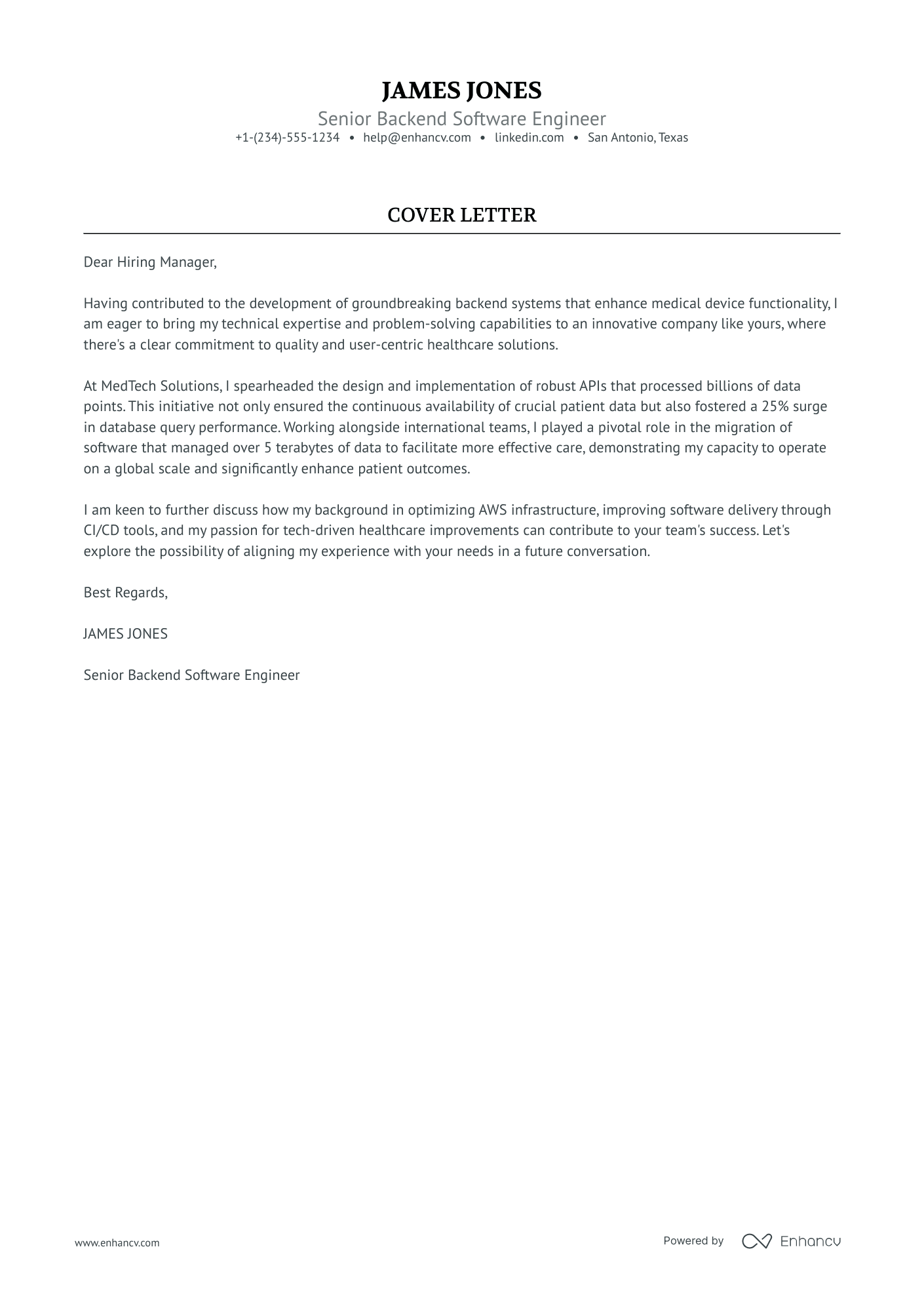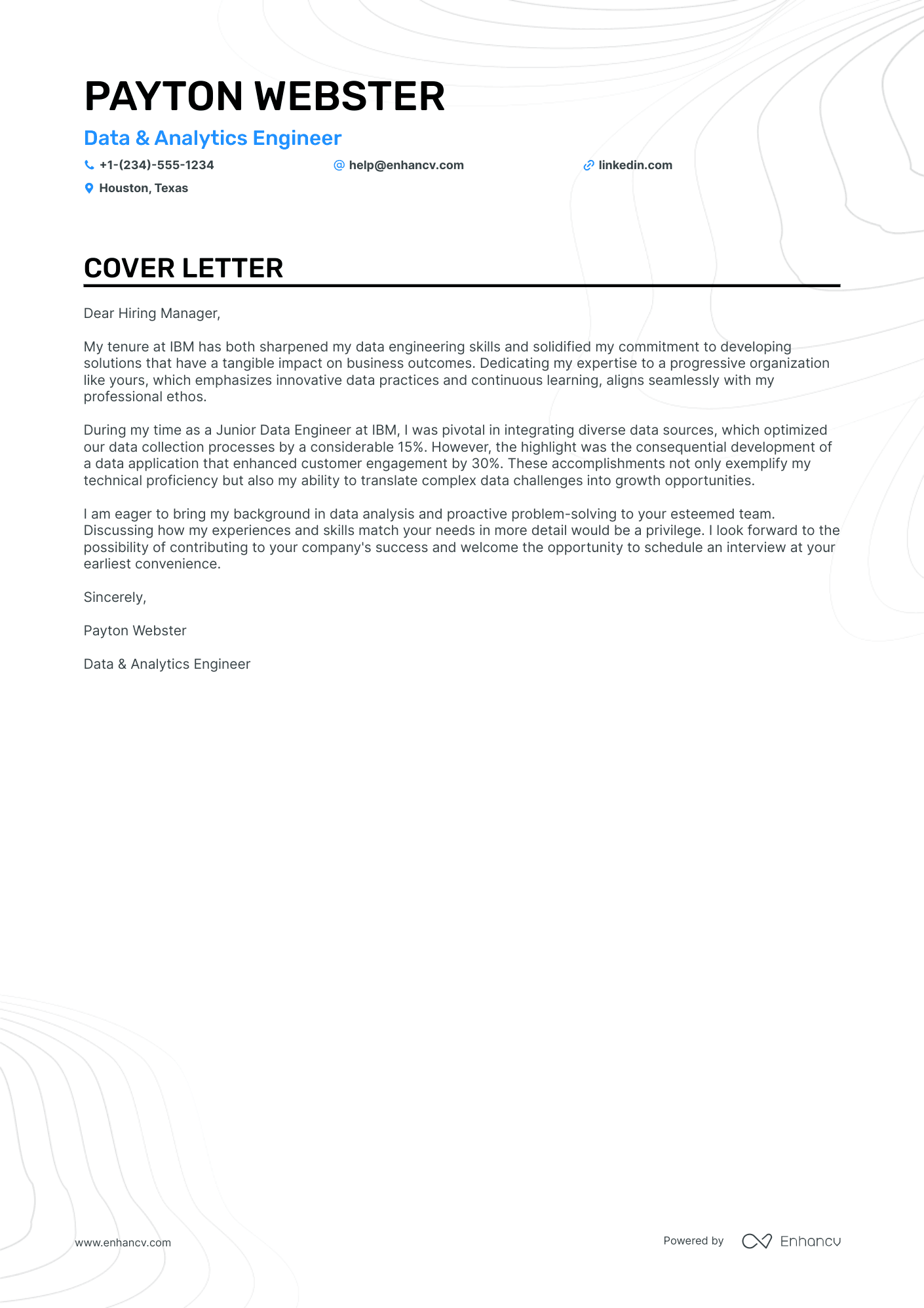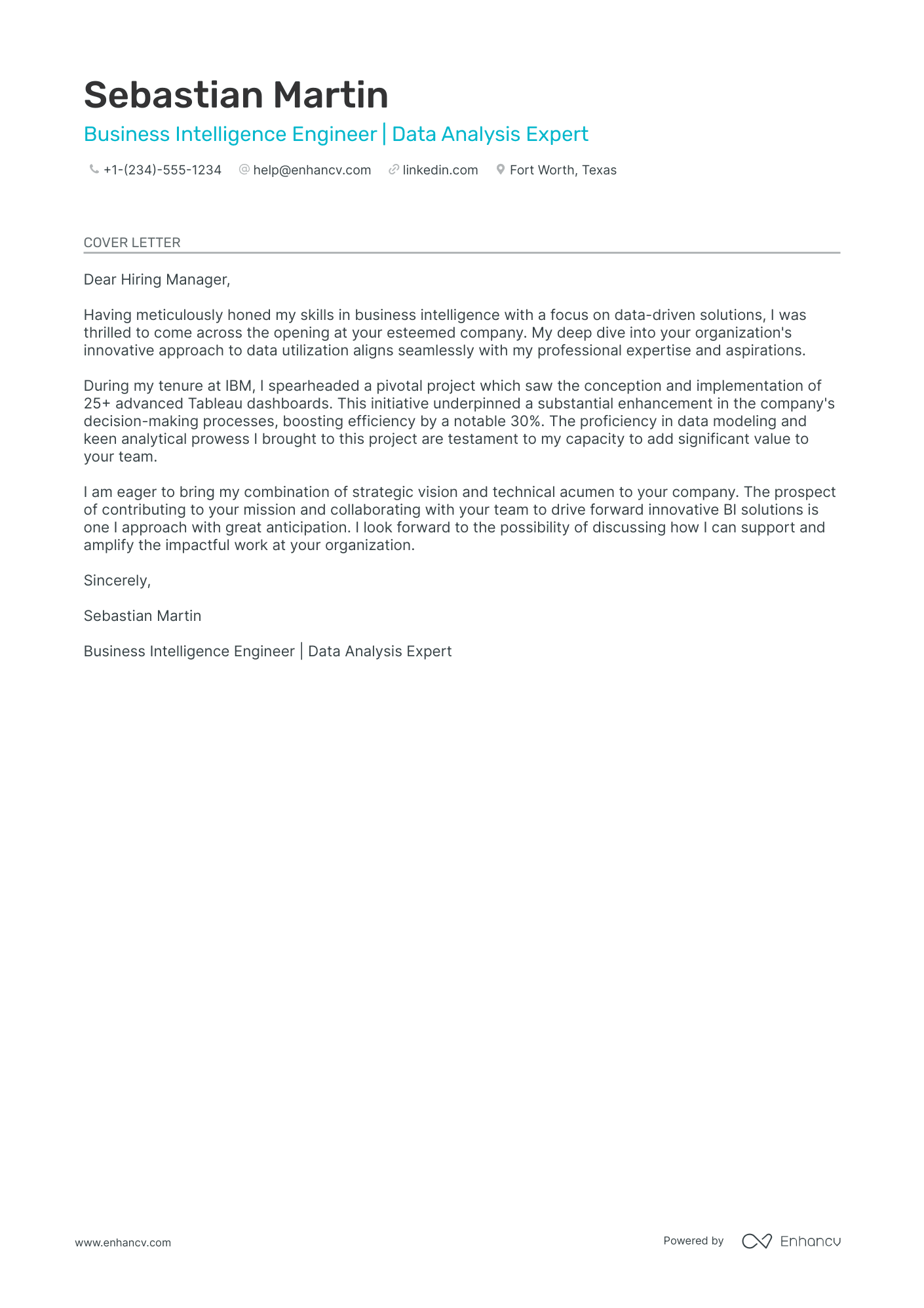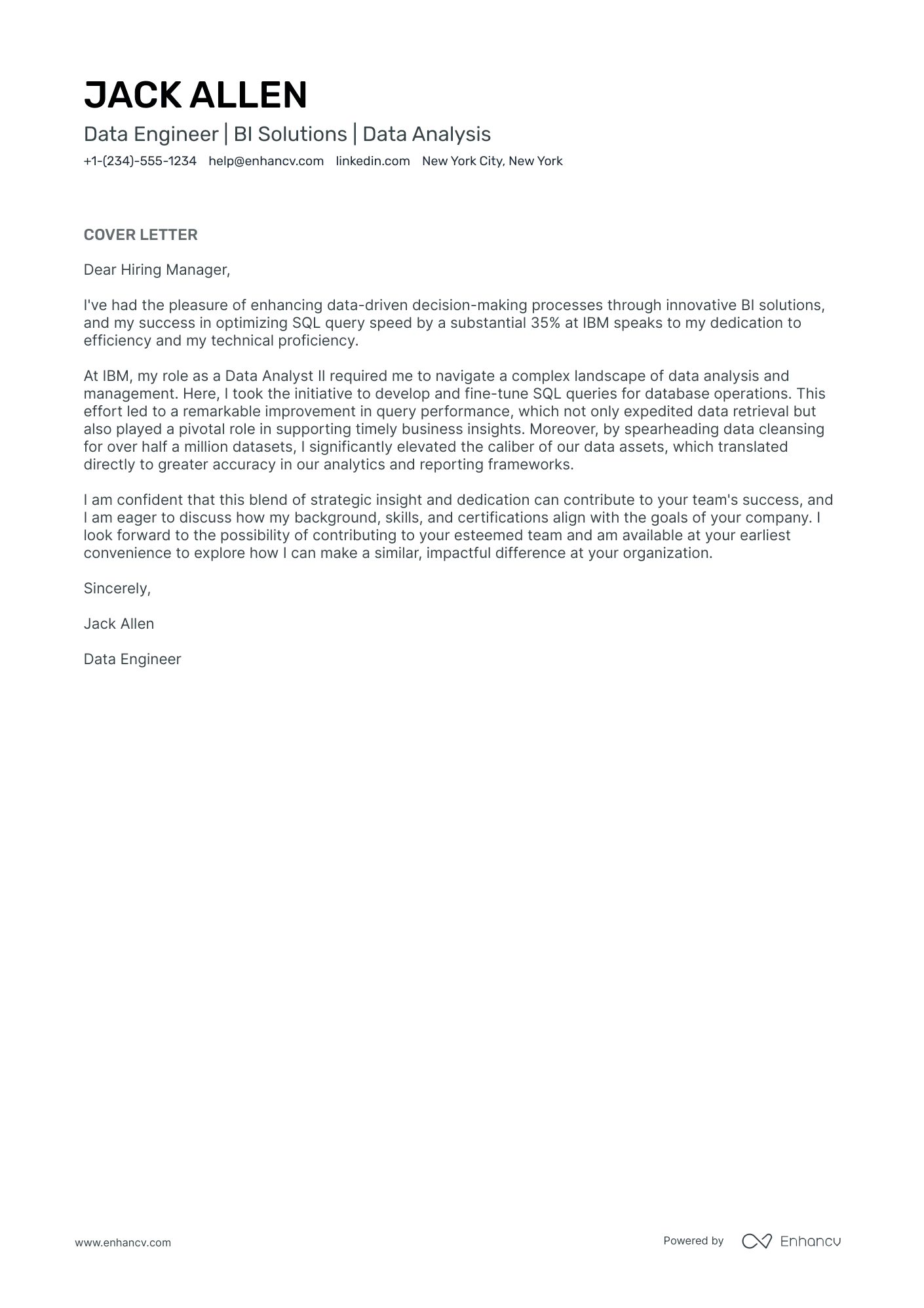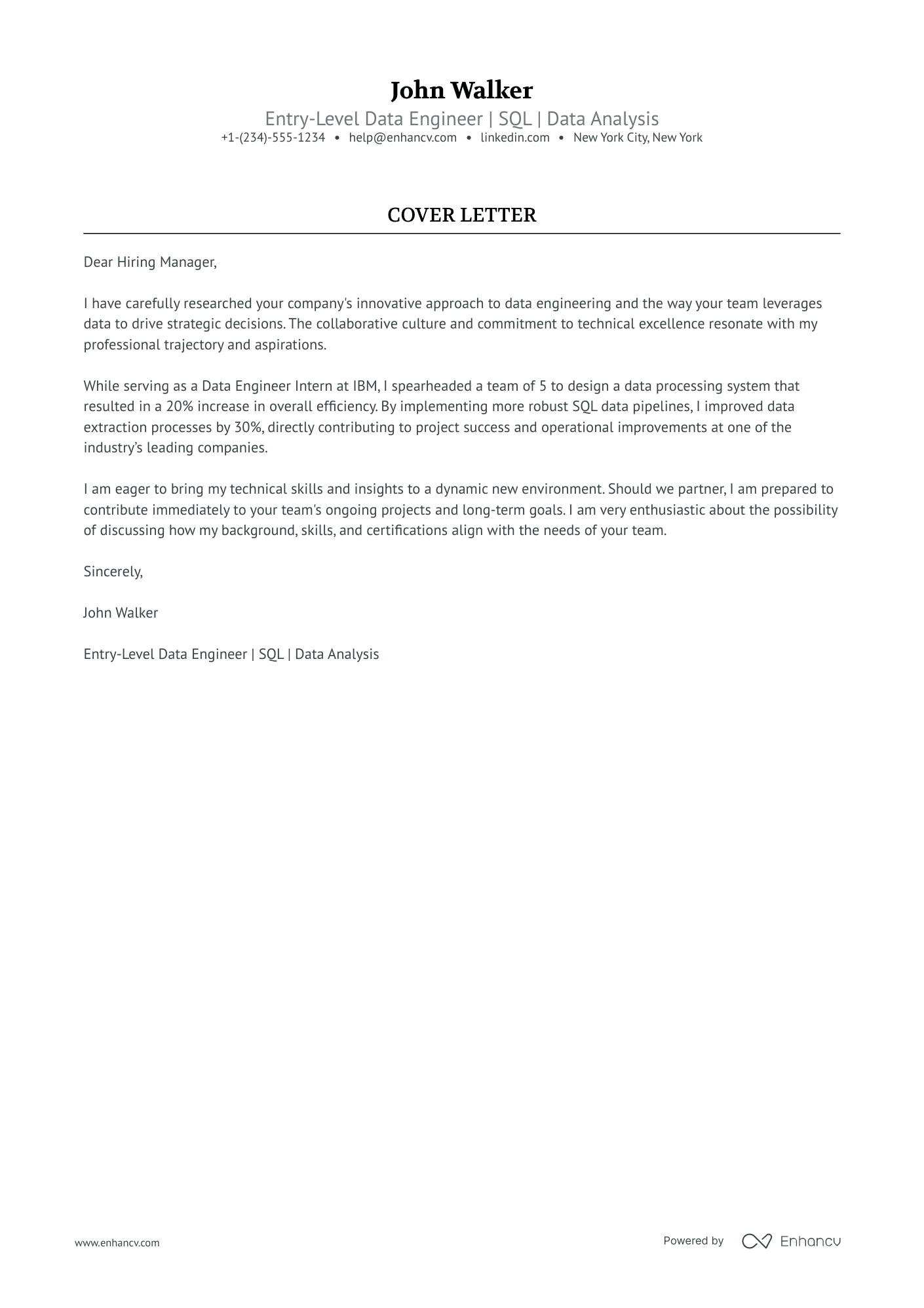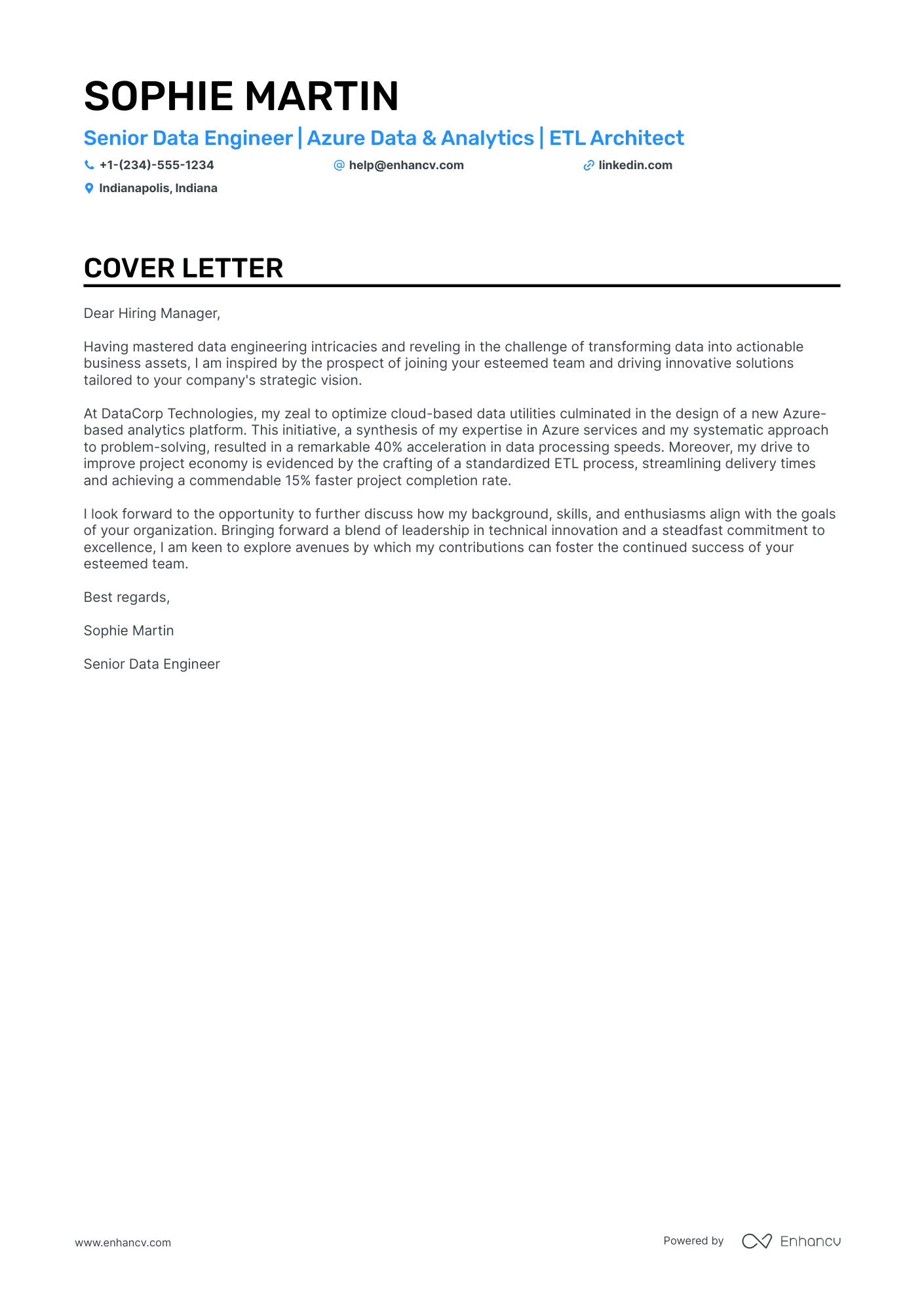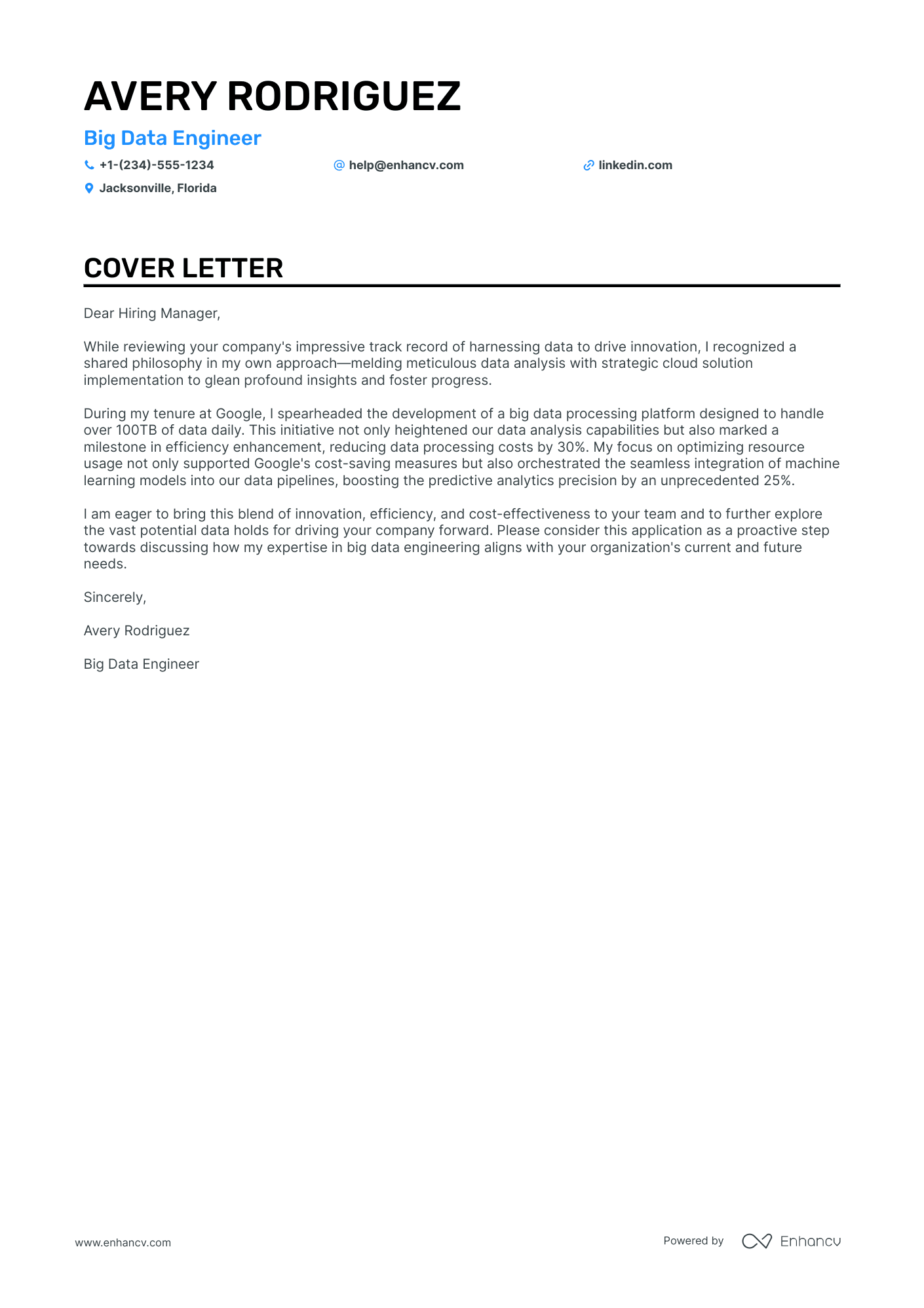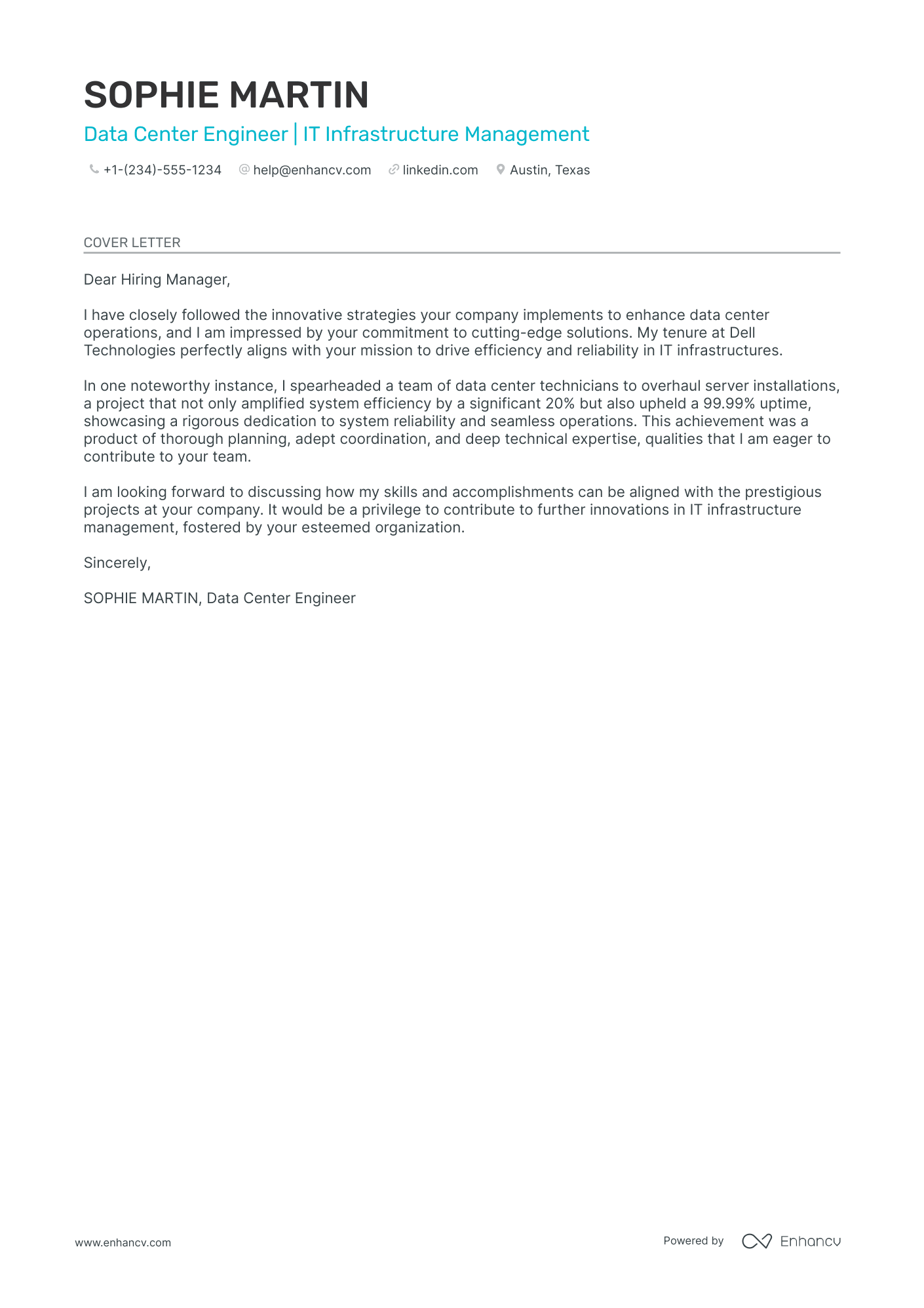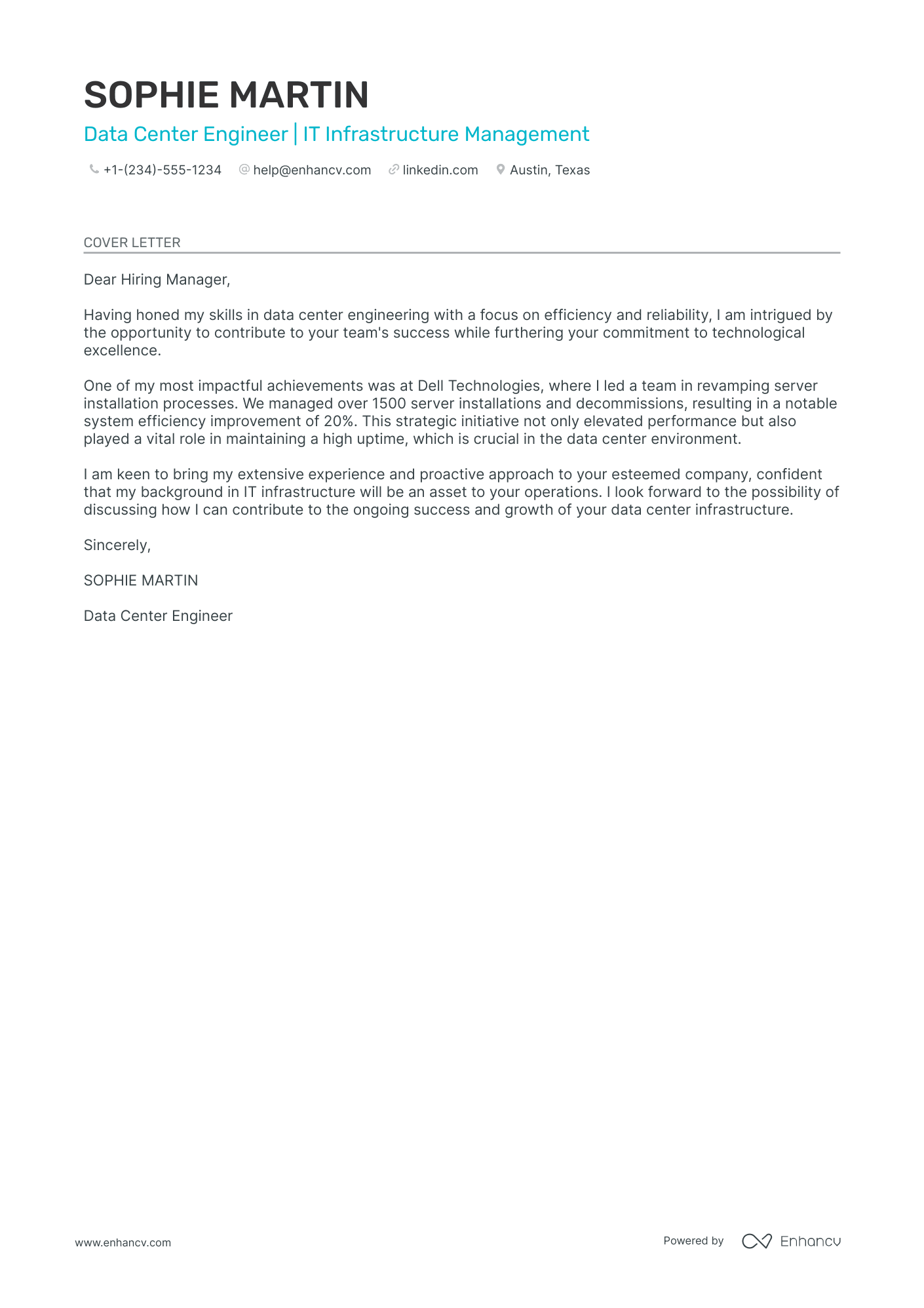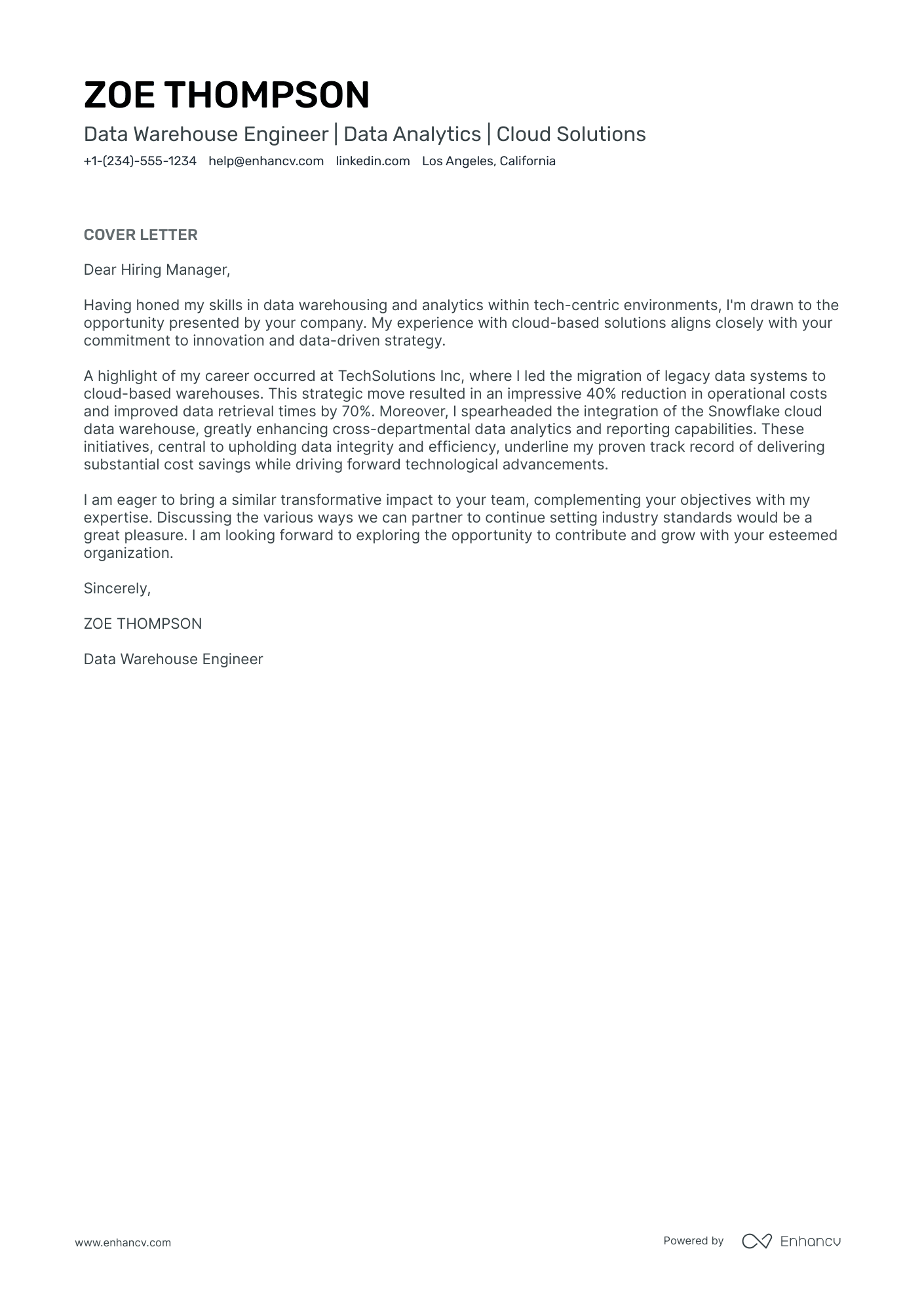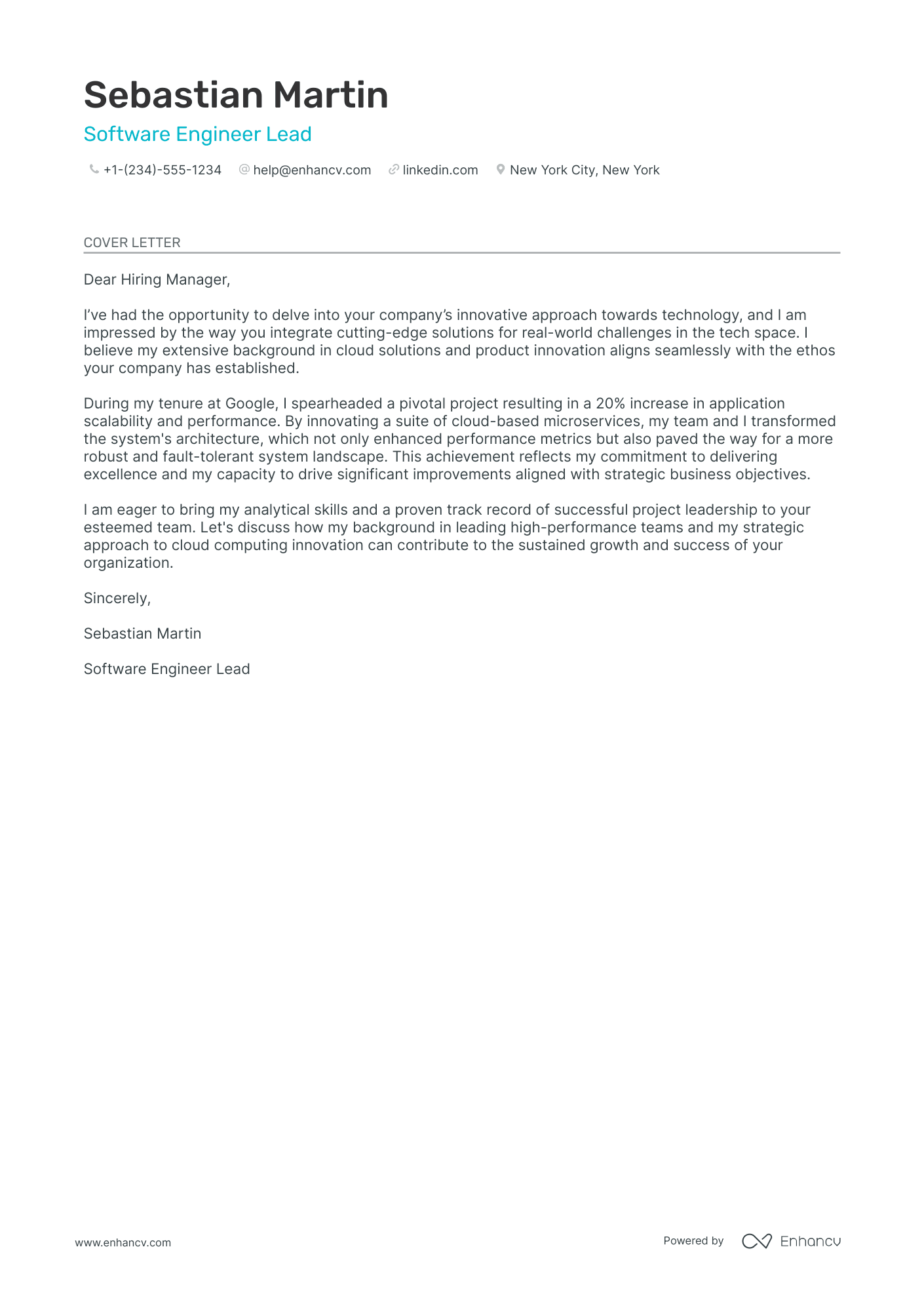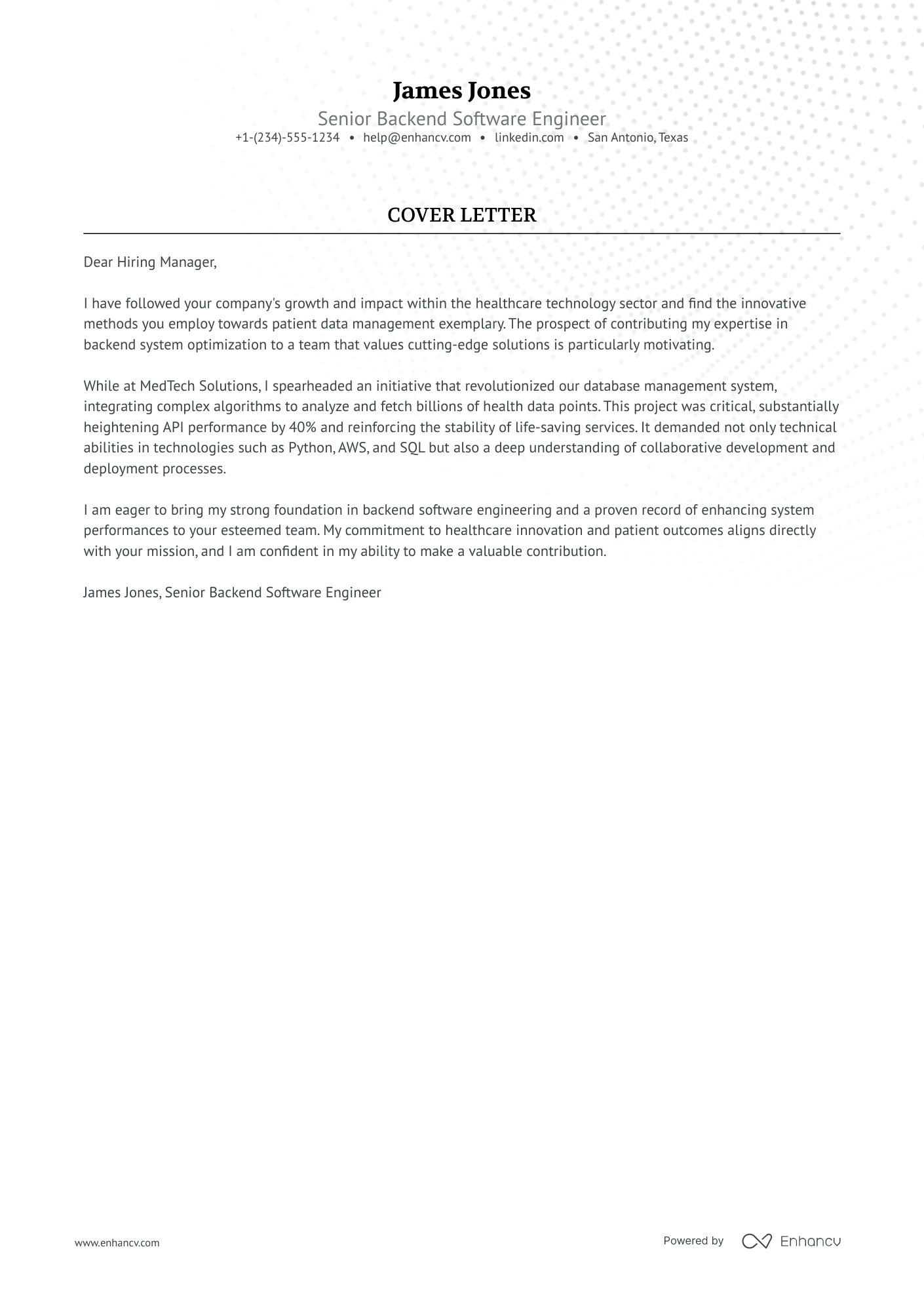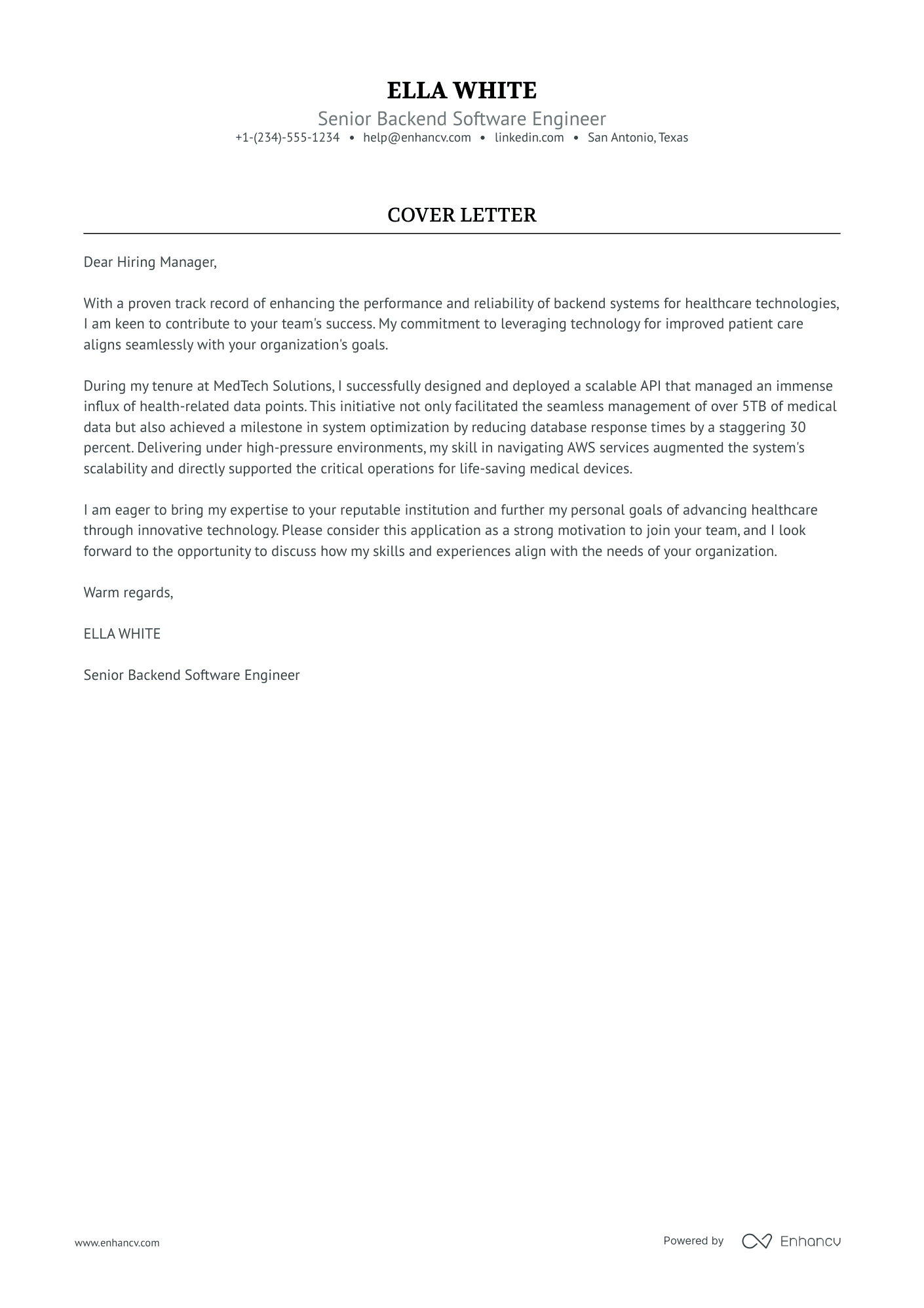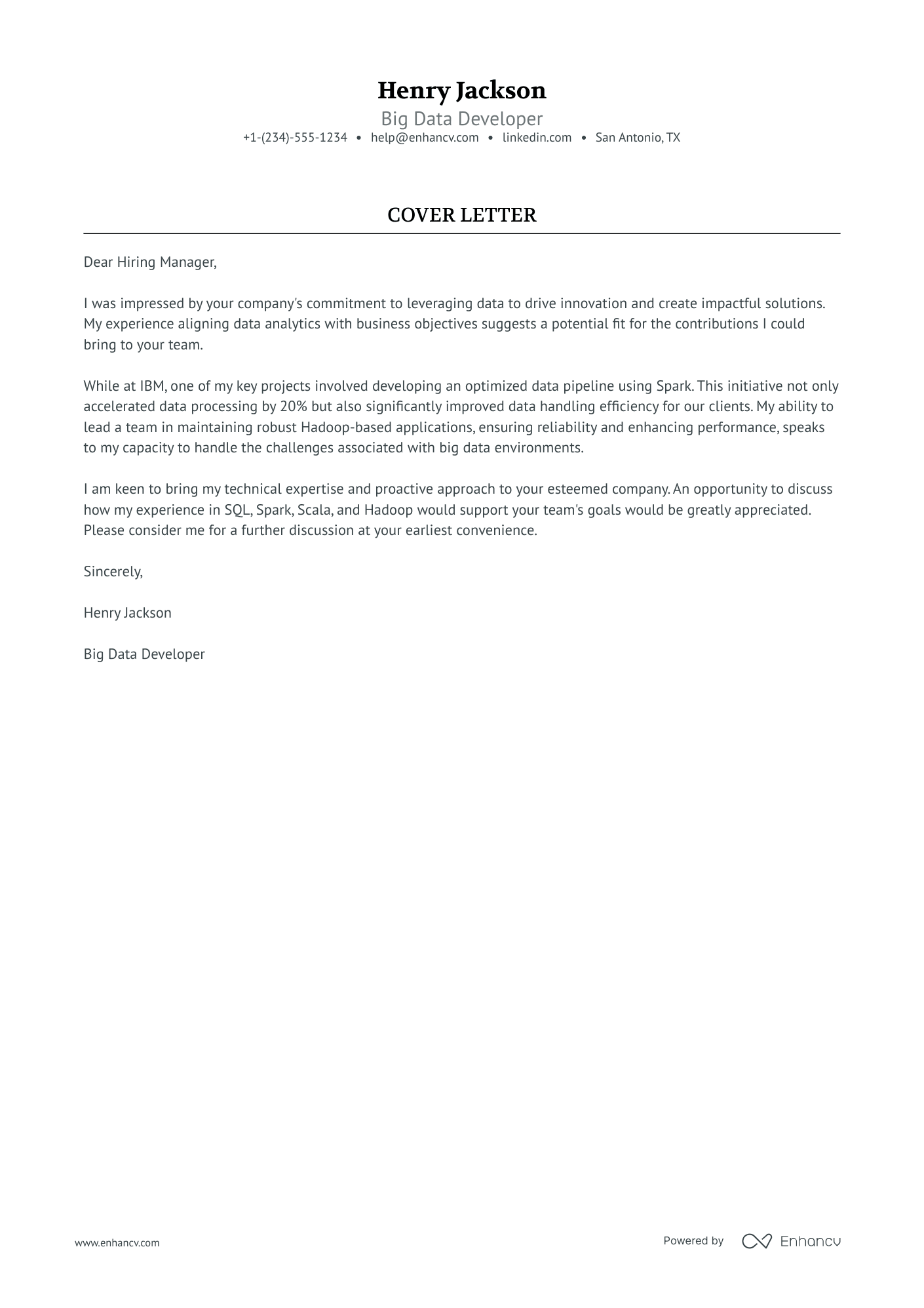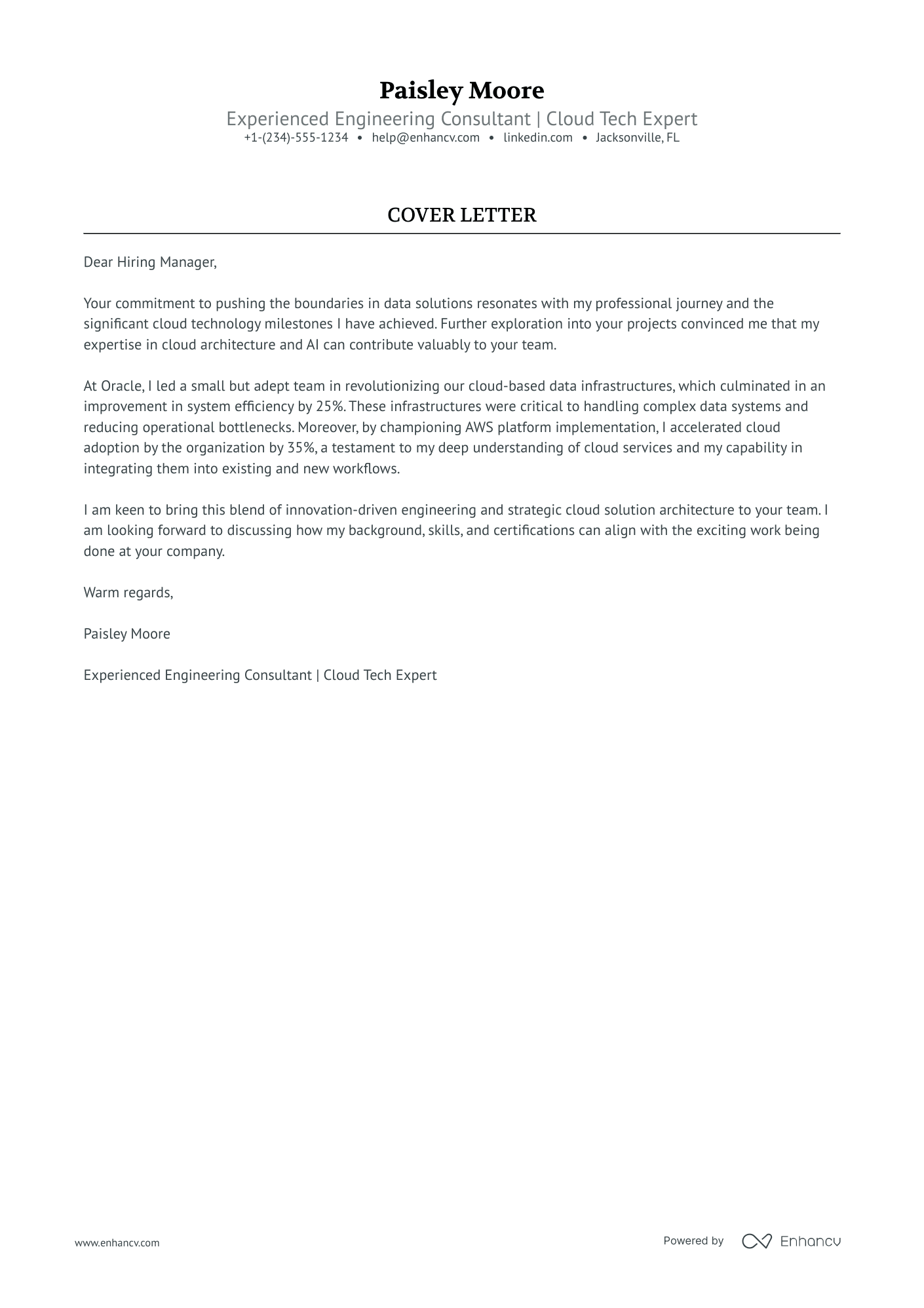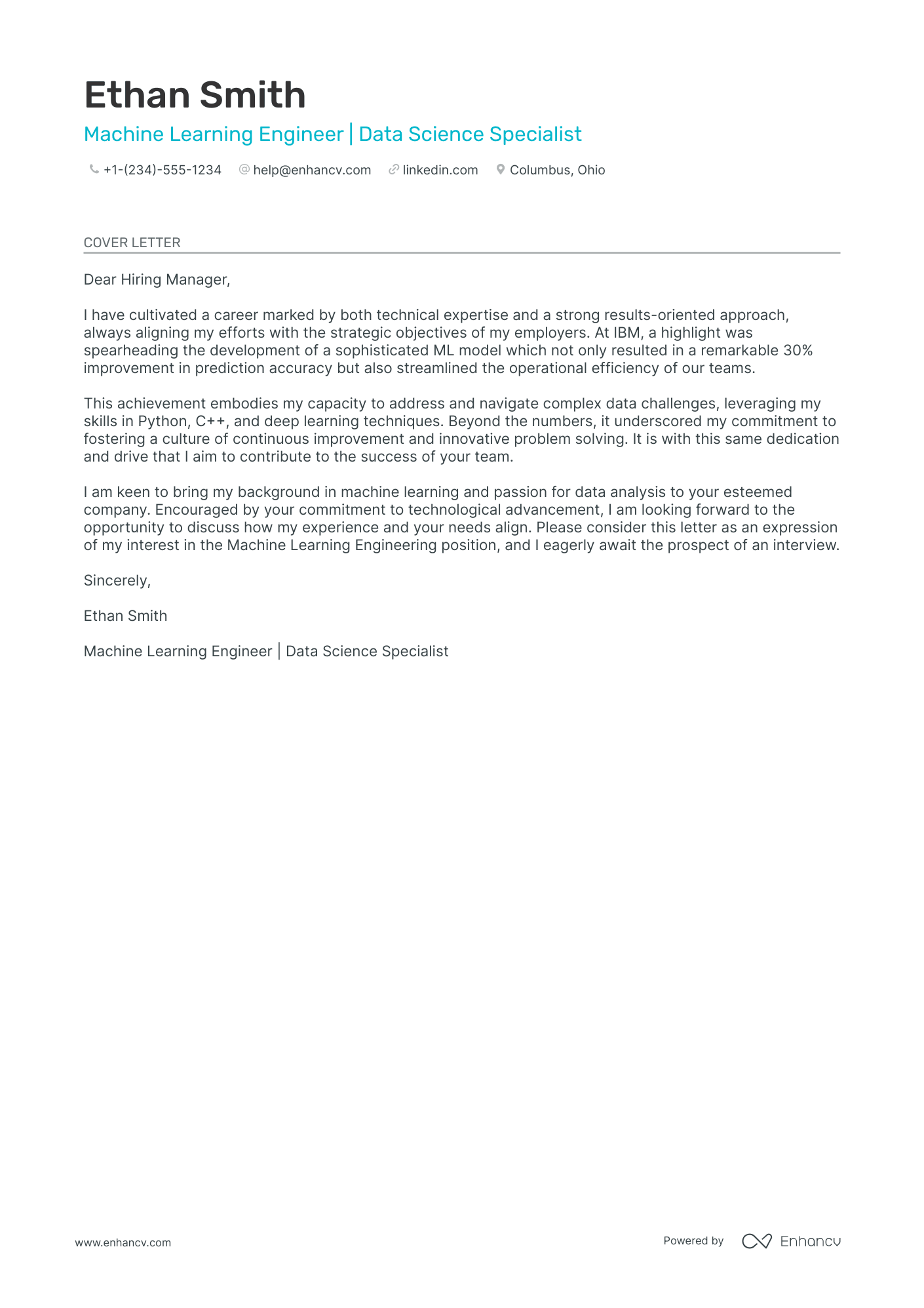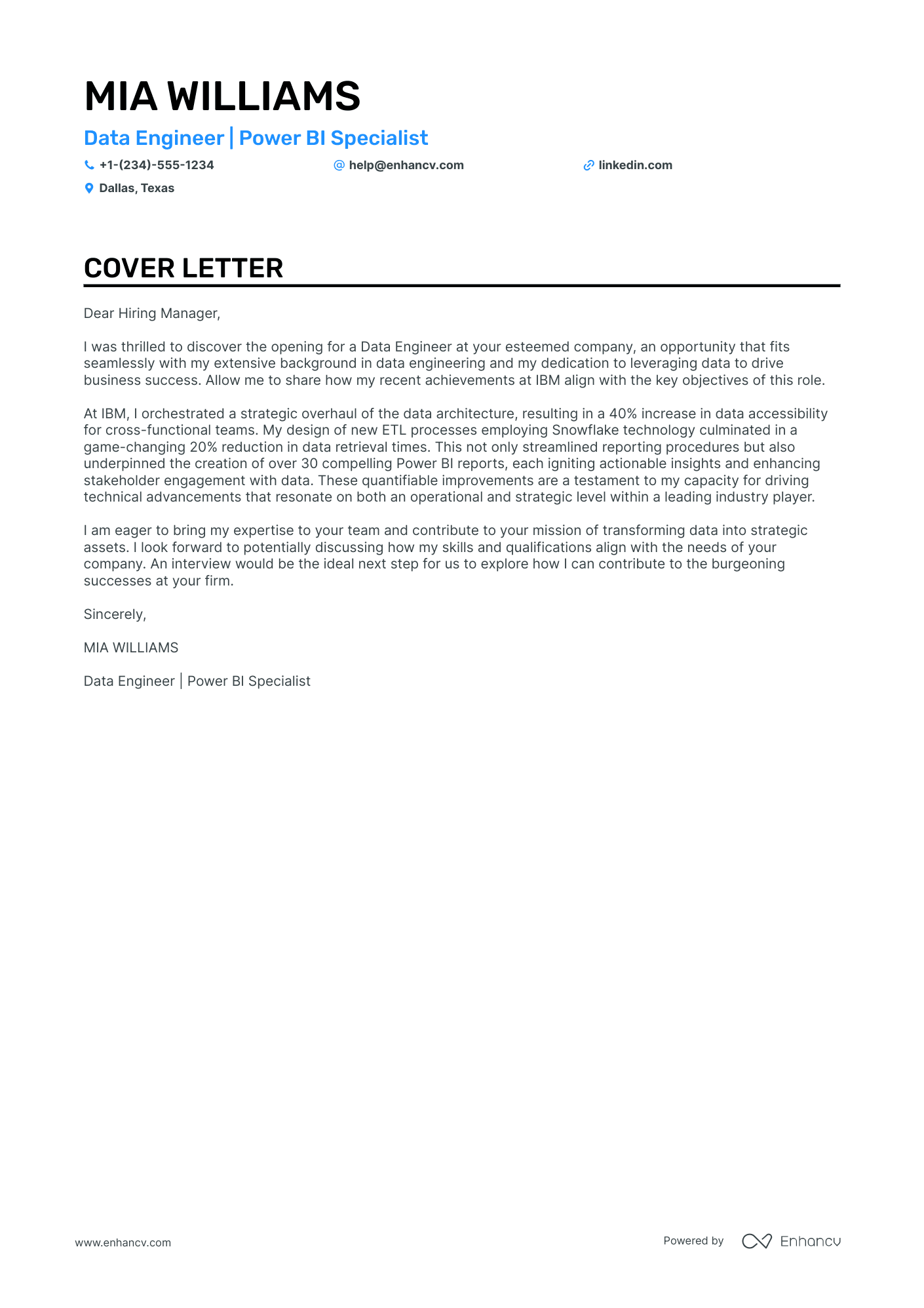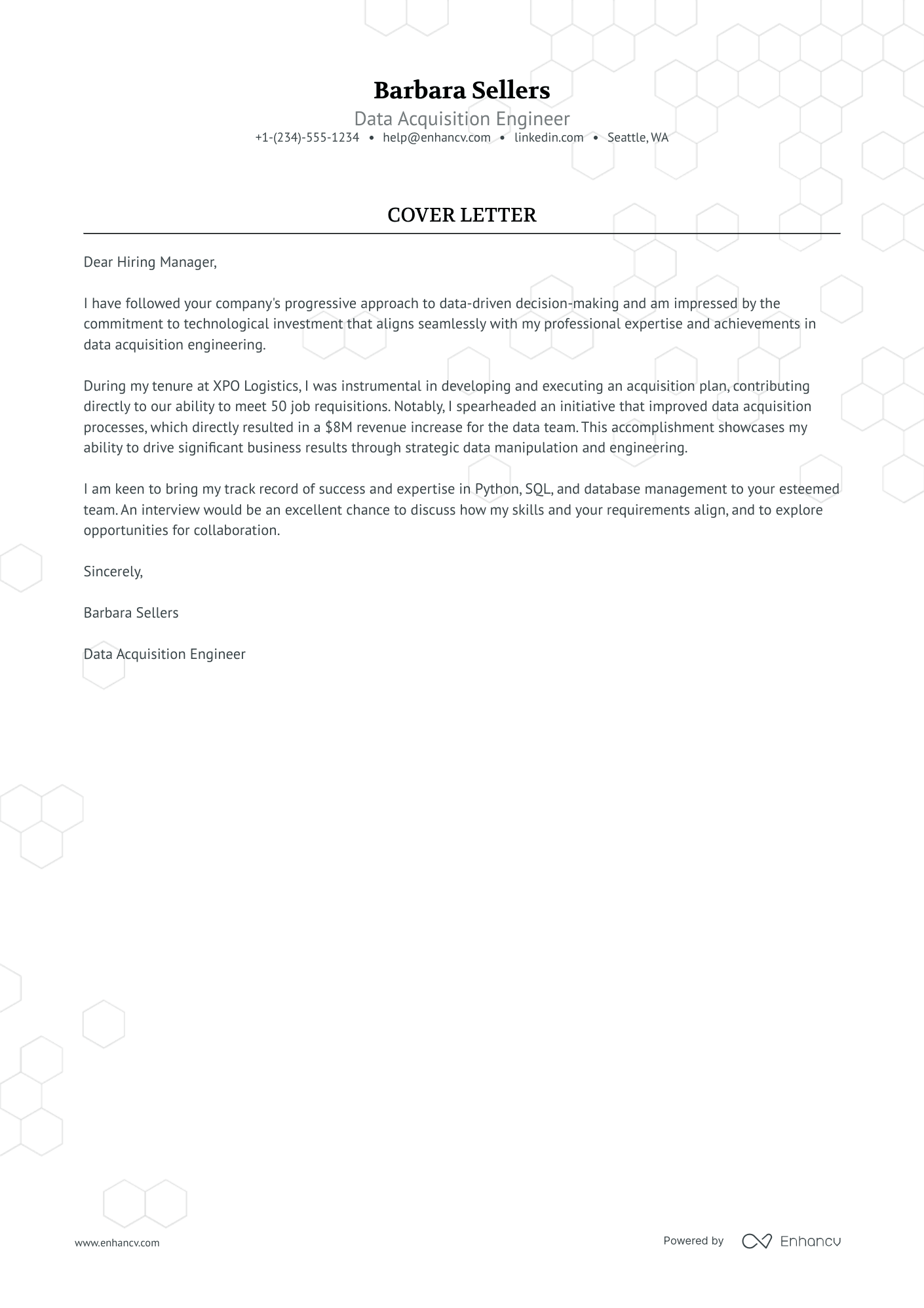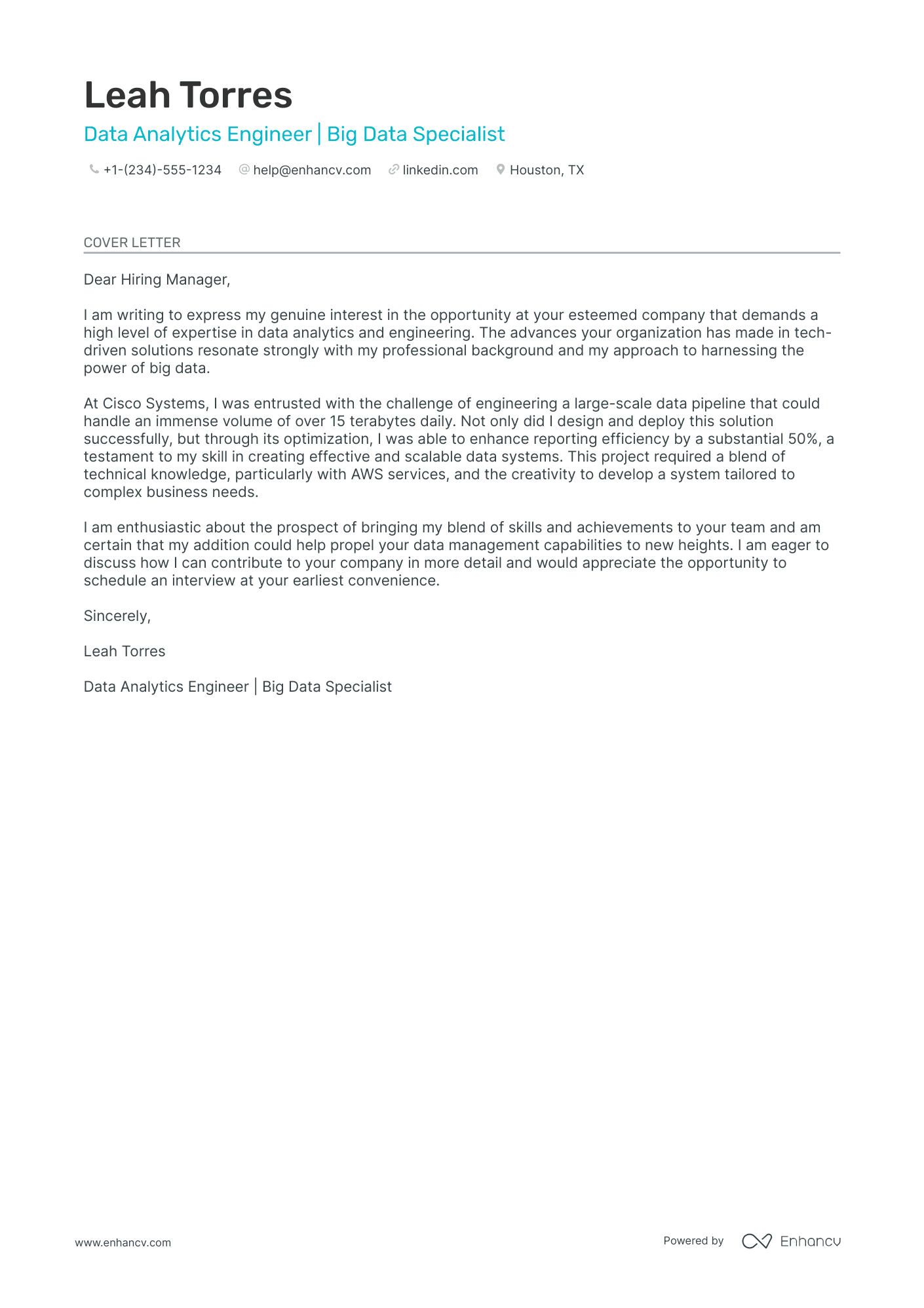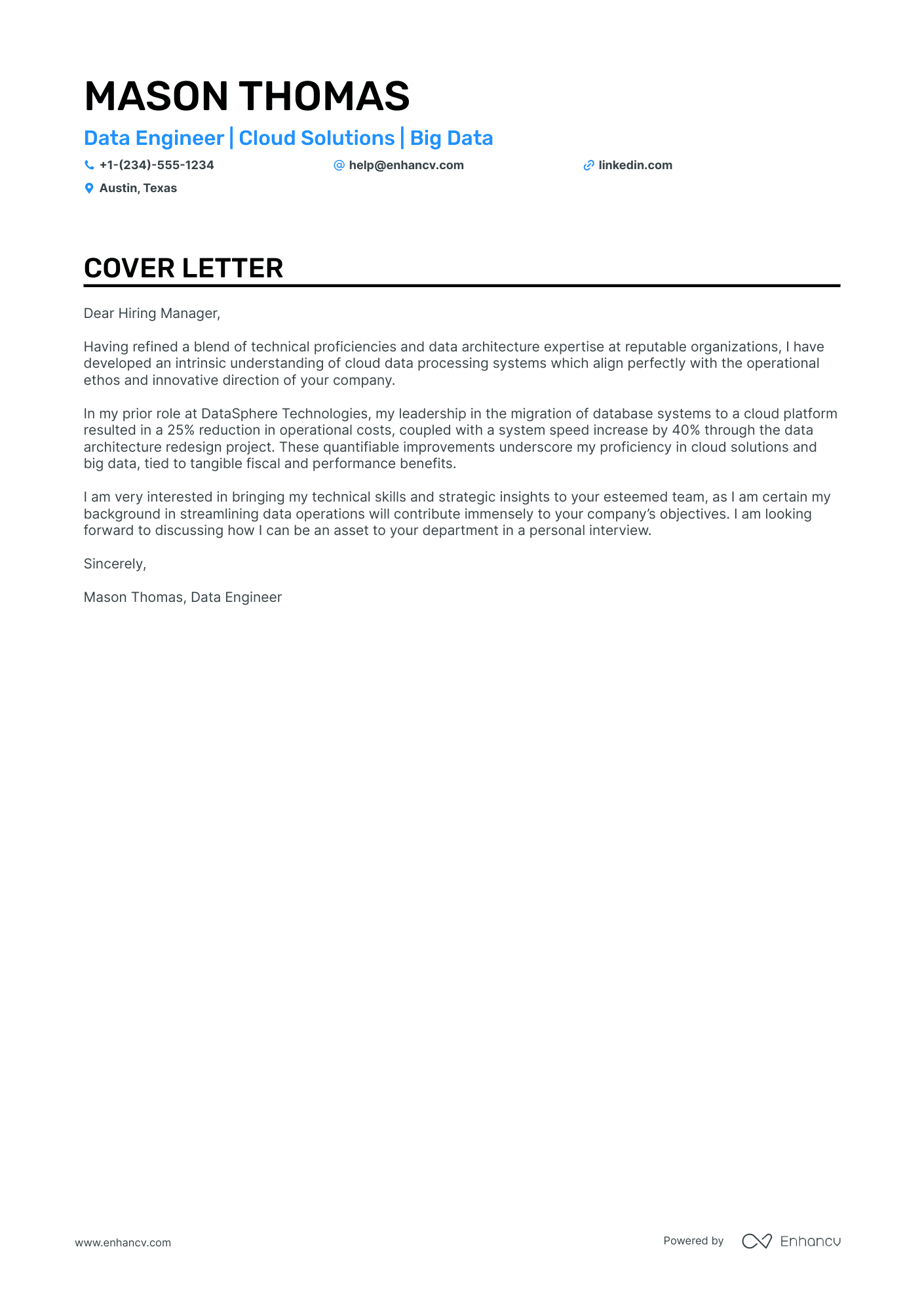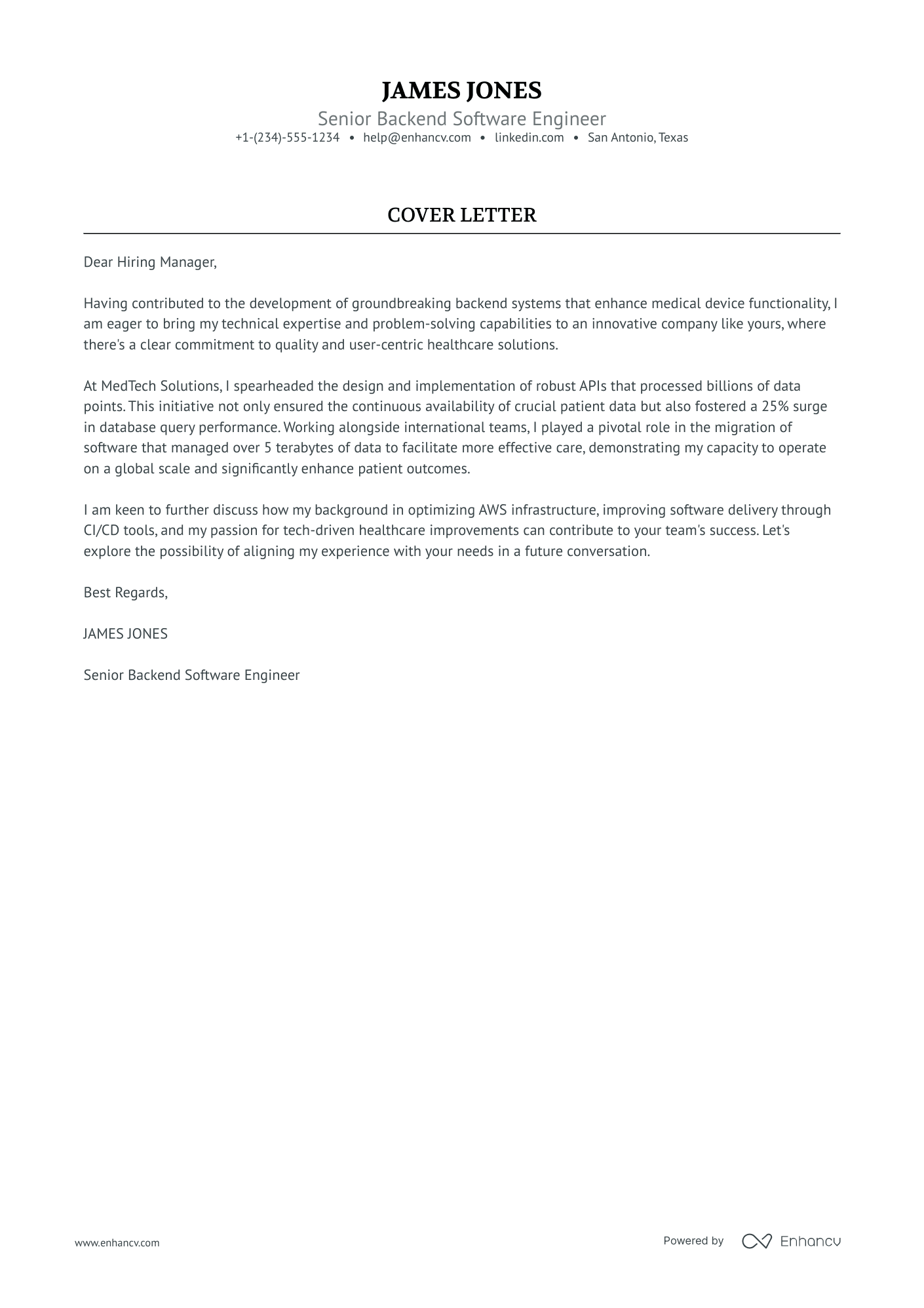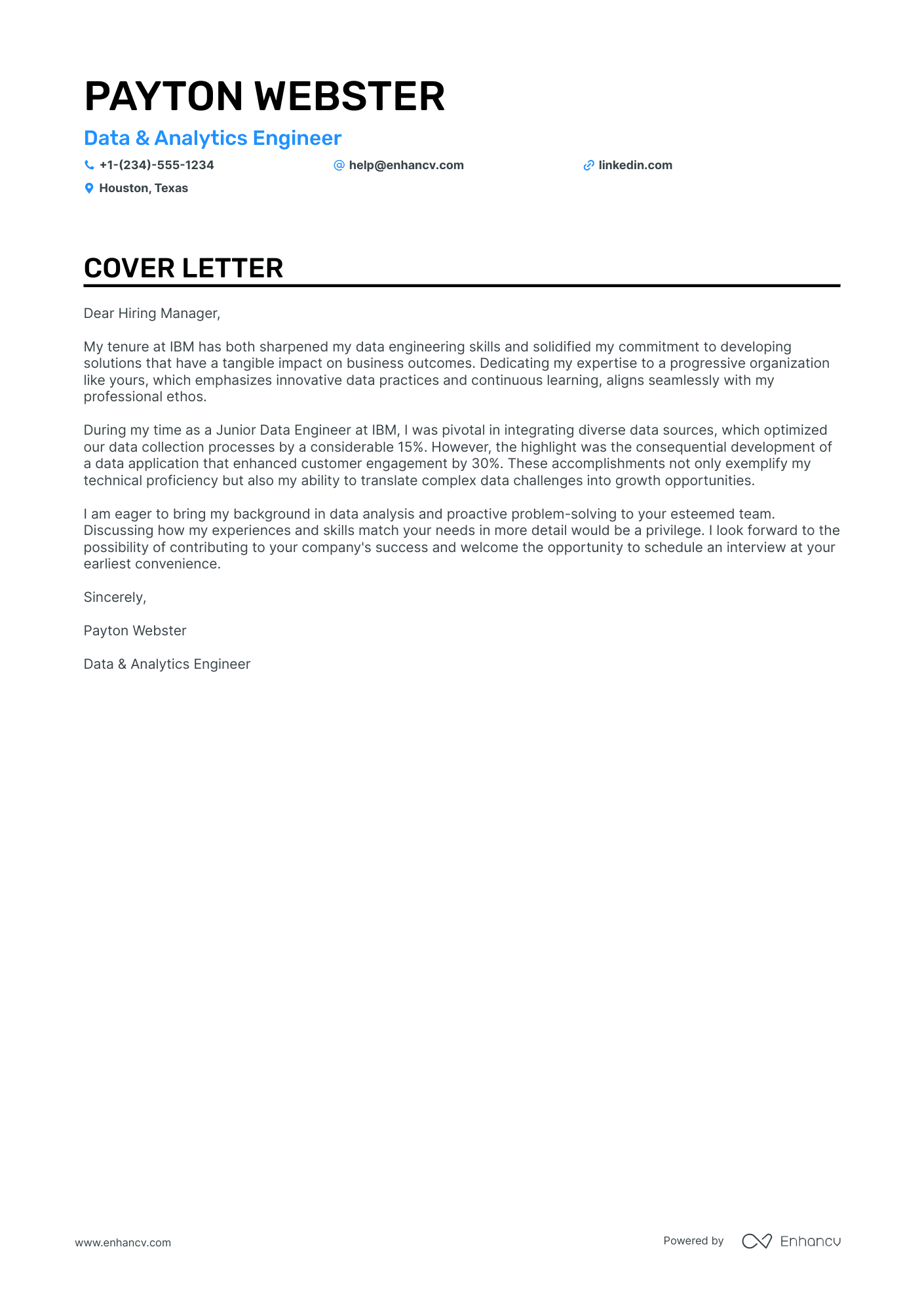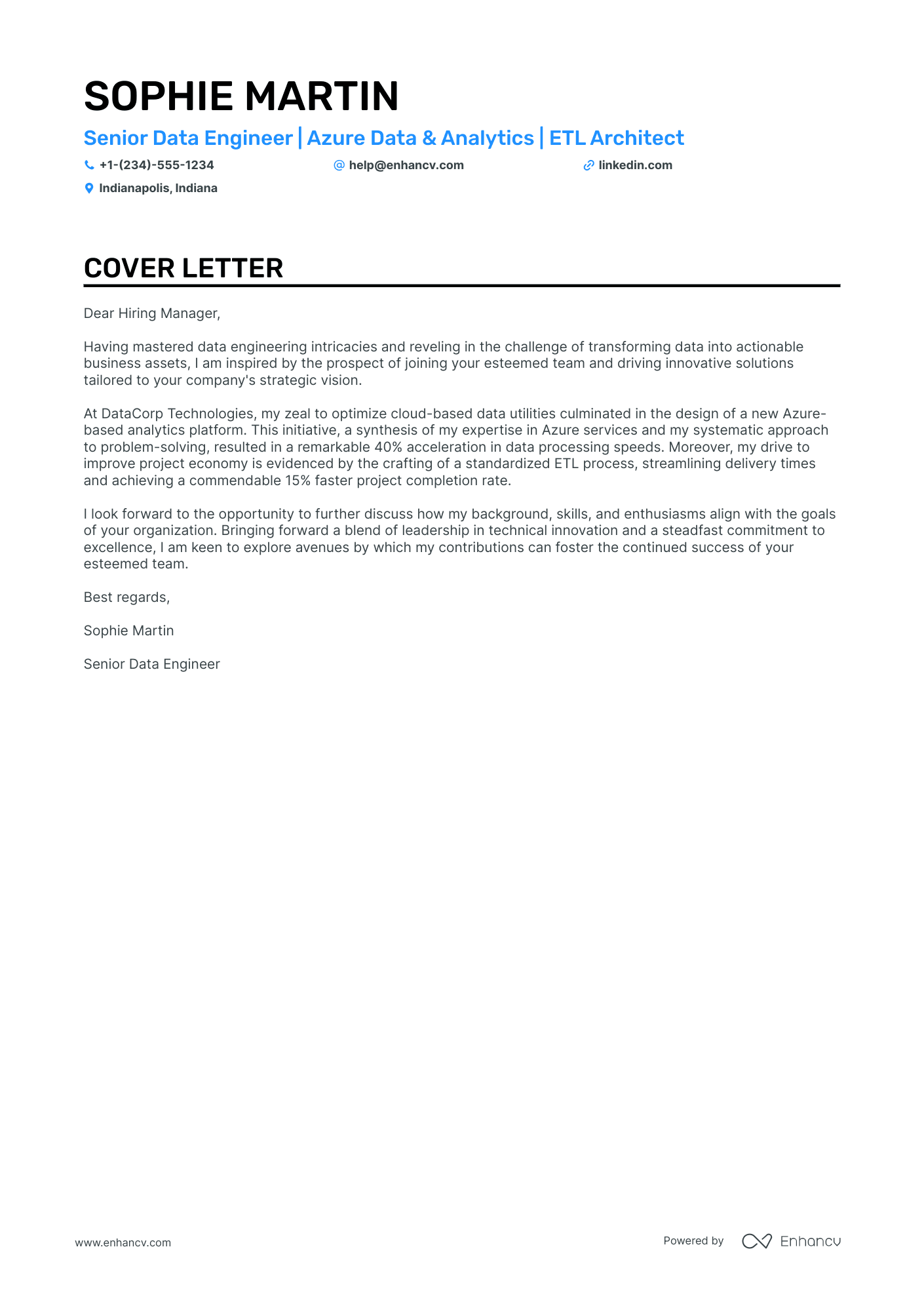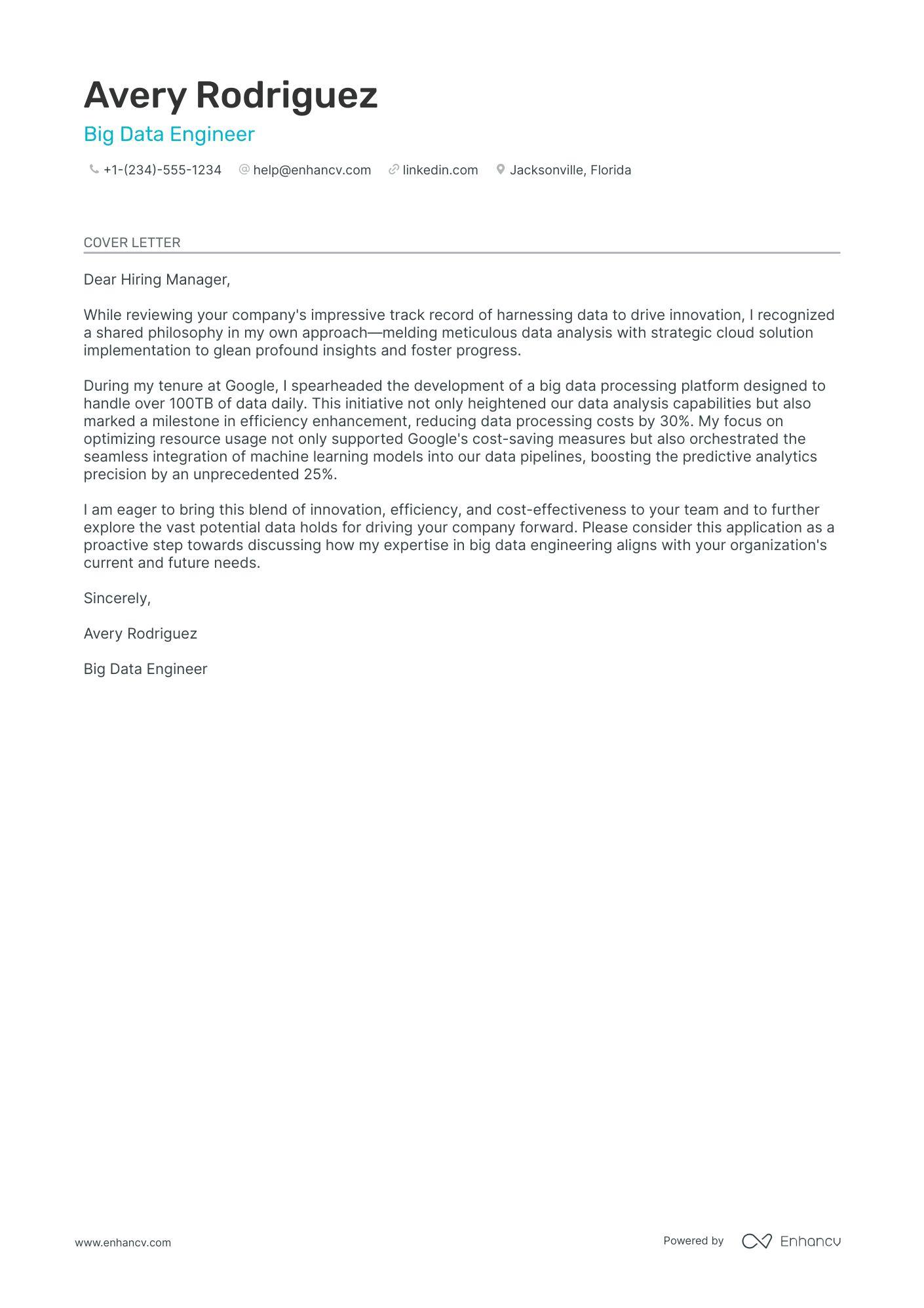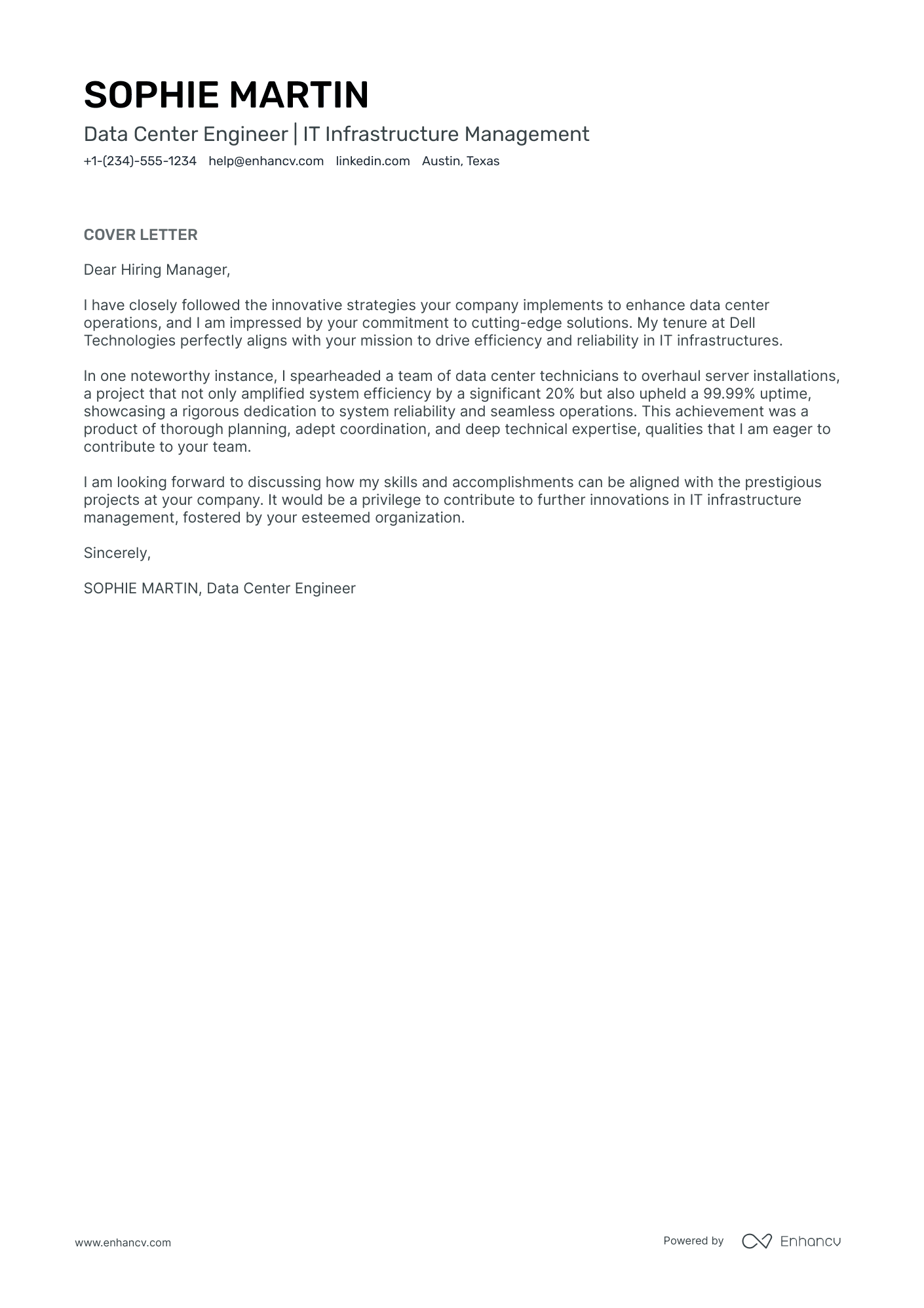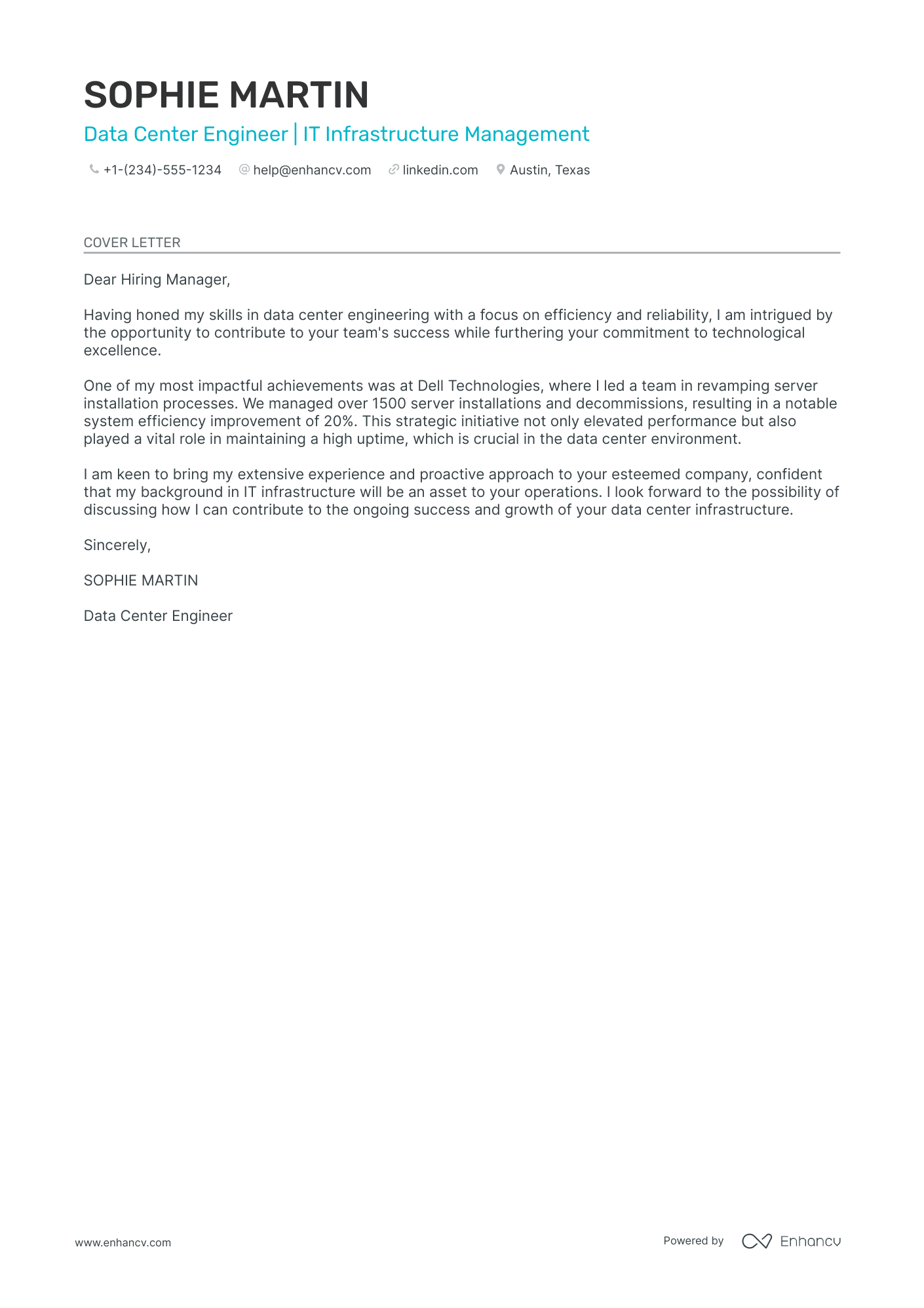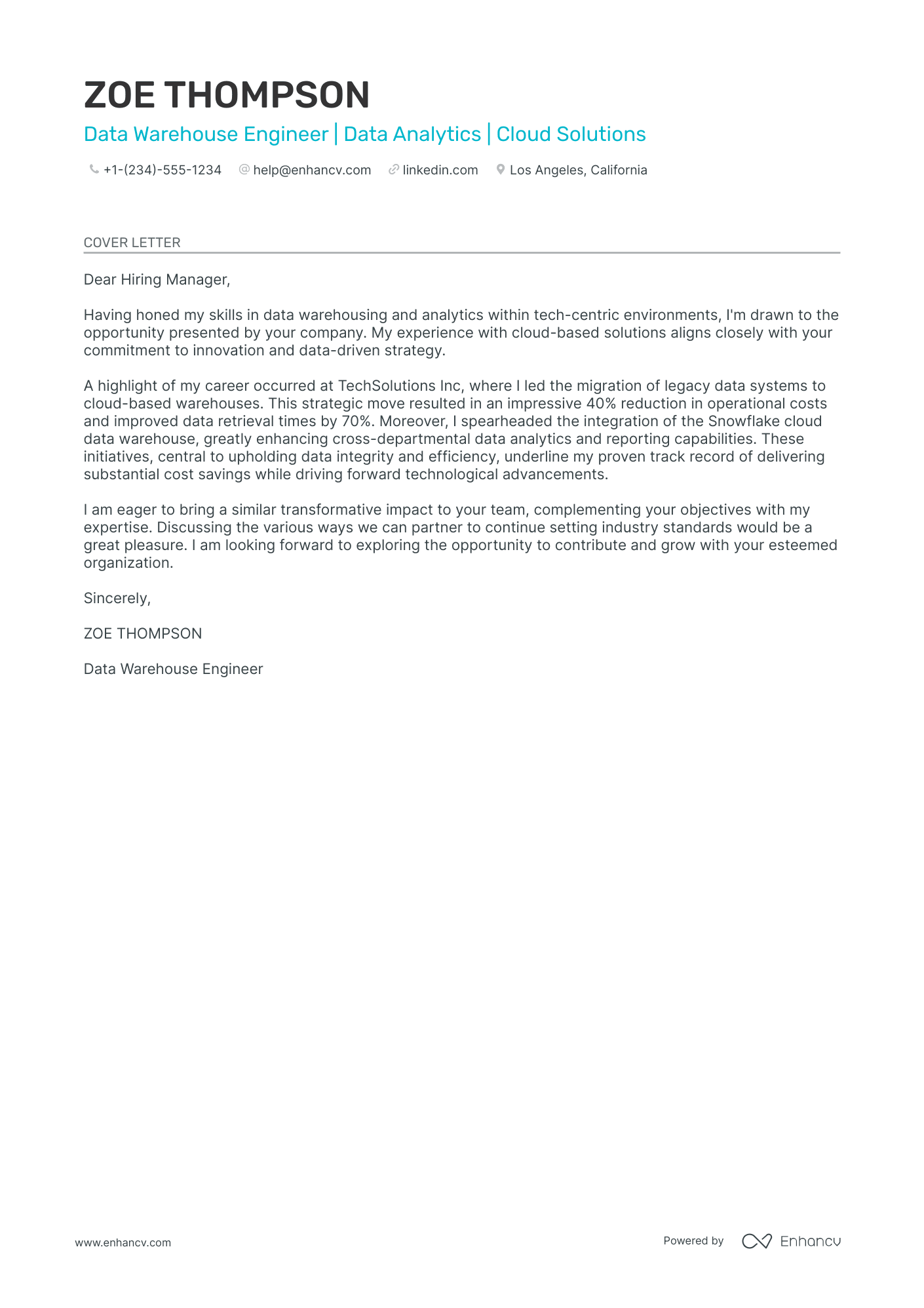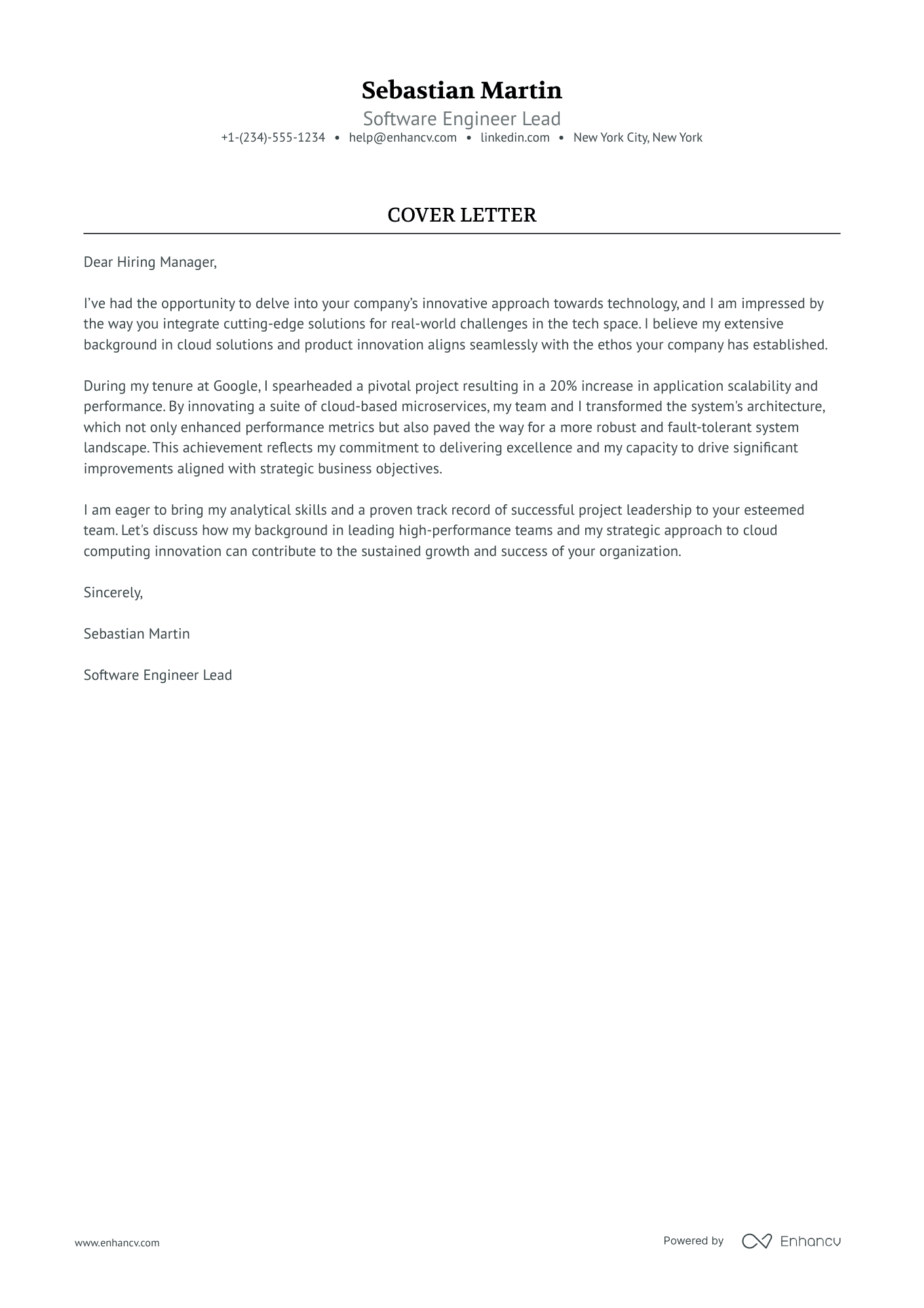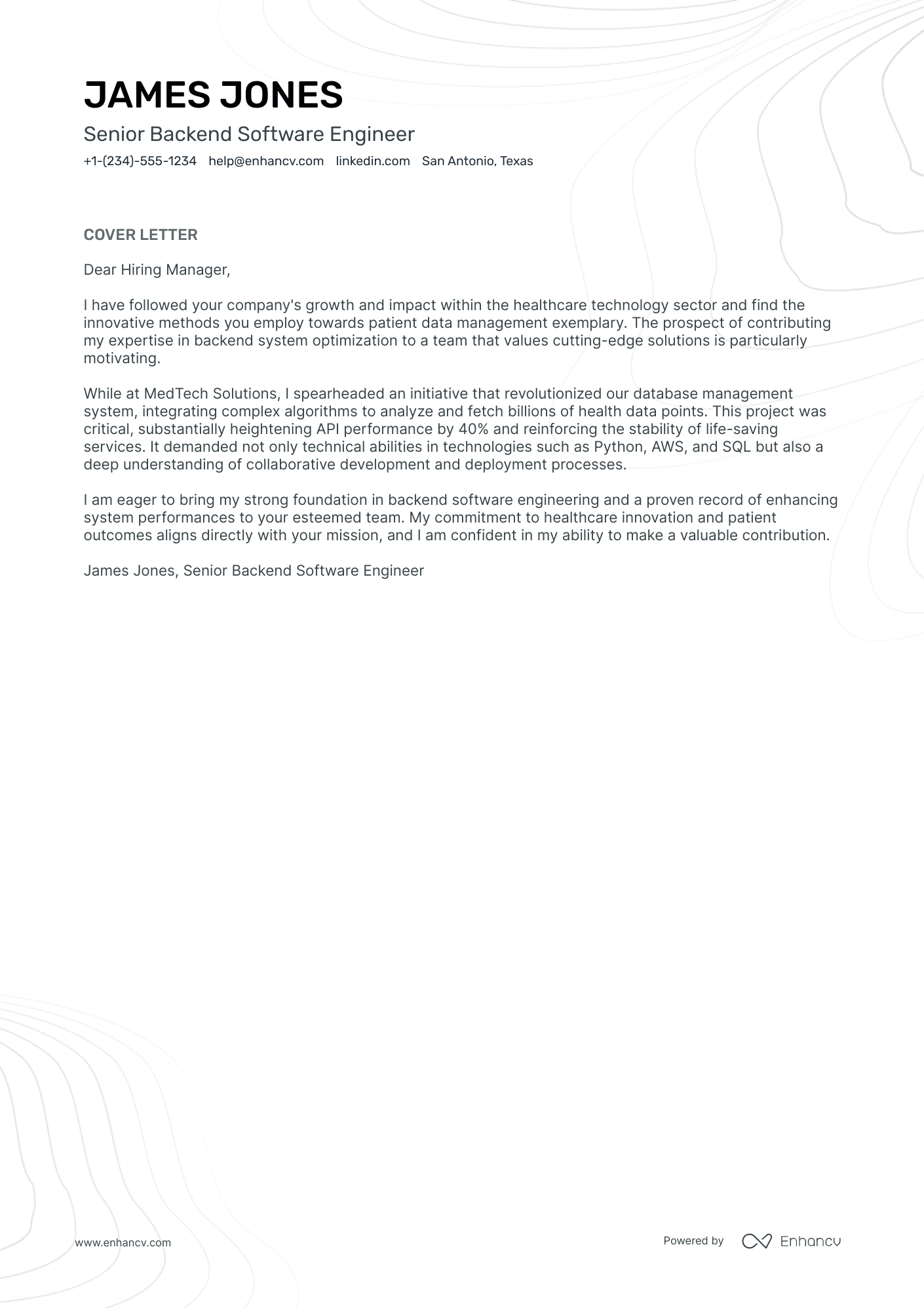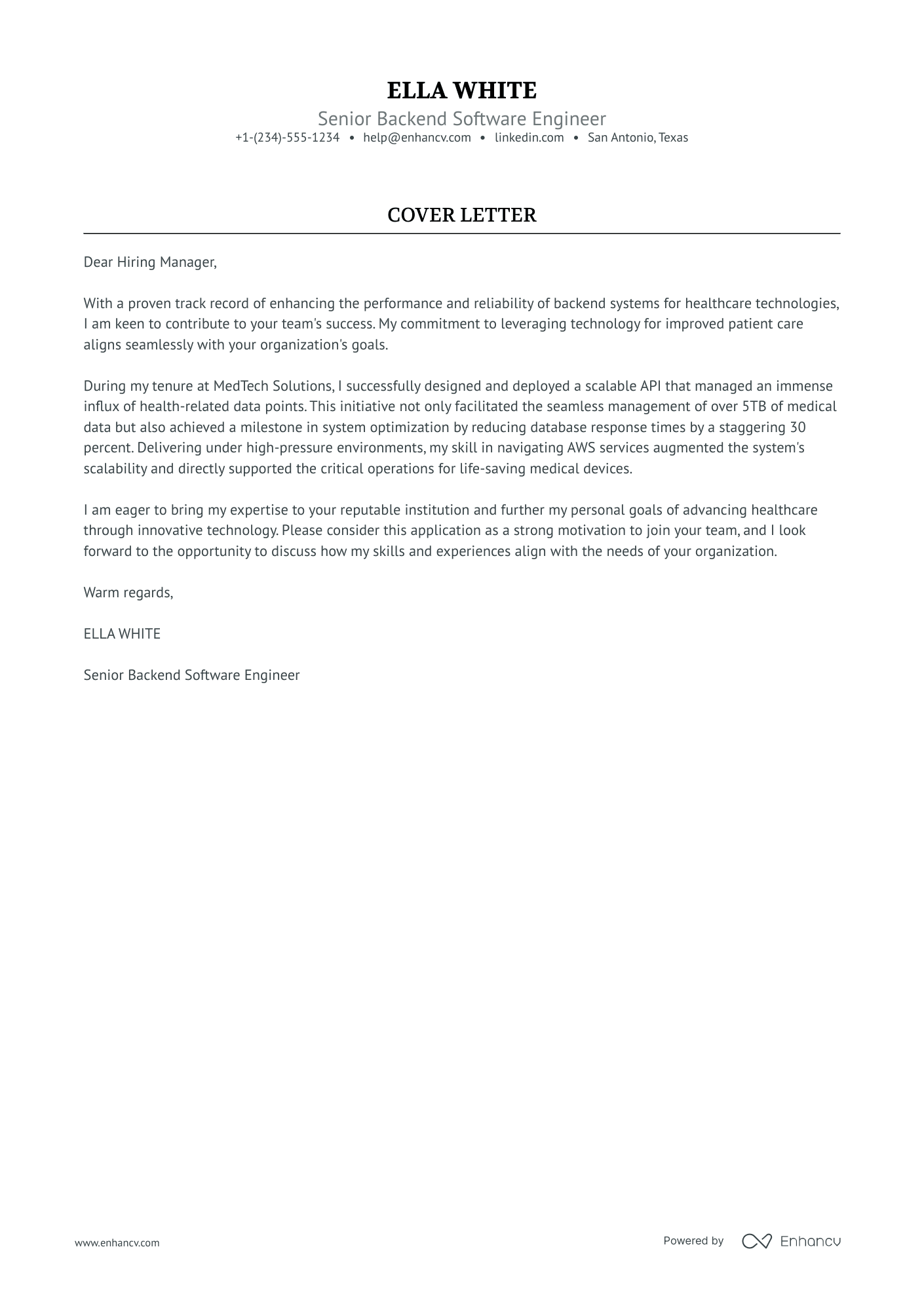Crafting the perfect data engineer cover letter can be a daunting task. You've found your dream job, and the application process requires a cover letter—a chance to showcase your best professional achievement. The key is to tell your unique story without echoing your resume, all while keeping it formal yet free from overused clichés. Remember, making a strong impression hinges on a concise letter capped at one page. Let's unlock the secrets to creating a cover letter that stands out.
- Making excellent use of job-winning real-life professional cover letters;
- Writing the first paragraphs of your data engineer cover letter to get attention and connect with the recruiters - immediately;
- Single out your most noteworthy achievement (even if it's outside your career);
- Get a better understanding of what you must include in your data engineer cover letter to land the job.
Let the power of Enhancv's AI work for you: create your data engineer cover letter by uploading your resume.
If the data engineer isn't exactly the one you're looking for we have a plethora of cover letter examples for jobs like this one:
- Data Engineer resume guide and example
- Database Manager cover letter example
- Data Reporting Analyst cover letter example
- Data Analytics Manager cover letter example
- Senior Data Scientist cover letter example
- Database Engineer cover letter example
- Data Specialist cover letter example
- Database Architect cover letter example
- Marketing Data Analyst cover letter example
- SQL Data Analyst cover letter example
- Data Scientist cover letter example
Drop your resume here or choose a file.
PDF & DOCX only. Max 2MB file size.
Data engineer cover letter example
Carter Andrade
Austin, TX
+1-(234)-555-1234
help@enhancv.com
- Highlighting relevant past achievements, such as the development of a new ETL system and optimizing a database that led to a measurable 26% decrease in load, is a strong way to demonstrate competence and value to the potential employer.
- Addressing the specific challenges and goals of the potential employer's industry, in this case, healthcare data sets, shows that the applicant has an understanding of the domain and can tailor their skills to industry-specific needs.
- Expressing eagerness to bring specific qualities, such as rigorous efficiency and forward-thinking, to the new role, shows the applicant's alignment with the company's ethos and their proactive attitude towards contributing to the team.
- Mentioning the desire to discuss how one's background, skills, and certifications align with the company's needs sets the stage for a conversation about fit, indicating that the applicant has the required credentials and is ready to substantiate them in an interview.
What should your data engineer cover letter look like - formatting and organizing your information
Have you ever wondered what are the must-have sections you need to include in your data engineer cover letter? Our builder sets those up for you with:
- Header - dedicated to your contact information, the role you're applying for, and the date (don't forget to include your name);
- Greeting and opening paragraph - to create a personalized and memorable experience for recruiters;
- Body paragraph - emphasizing your skill set and knowledge that aligns with the role and helps you to stand out;
- Closing paragraph - leaving a great impression and ending with an optional signature.
Use a cover letter template to discover the best formatting for your data engineer cover letter: that is single-spaced paragraphs and wrapping your content in a one-inch margin.
Ensure that both your resume and data engineer cover letter are in the same font. Stand apart from the crowd by using modern, yet simple fonts, like Chivo and Rubik, instead of the overused Arial and Times New Roman.
Did you know that the Applicant Tracker System (or ATS) won't be assessing your data engineer cover letter? Instead, submit your profile in PDF to recruiters to keep the same formatting and the design intact.
Maximize your efficiency! With our free cover letter generator, you’ll have a great letter in moments.
The top sections on a data engineer cover letter
- Header: Include your contact information and the date, as well as the employer's contact information, which establishes the professionalism expected of a data engineer.
- Greeting: Address the hiring manager by name if possible, showing attention to detail—a skill crucial for a data engineer who will be working with precise data sets.
- Introduction: Briefly highlight your enthusiasm for data engineering and how your skills align with the job description, to immediately show your suitability for the role.
- Professional Experience and Skills: Detail your relevant data engineering experience, technical skills, and how you've applied them in practical scenarios, showcasing your capability to handle the data infrastructure needs of the company.
- Closing and Call to Action: Reaffirm your interest in the position, invite the recruiter to review your attached resume, and suggest a meeting or call for further discussion, reflecting the proactive attitude beneficial for a collaborative data engineering environment.
Key qualities recruiters search for in a candidate’s cover letter
- Strong proficiency in SQL and experience with NoSQL databases: Necessary for writing complex queries, managing data across various database systems, and optimizing data retrieval.
- Expertise in big data technologies (e.g., Hadoop, Spark, Kafka): Essential for handling and processing large data sets in distributed computing environments.
- Experience with data pipeline and workflow management tools (such as Airflow, Luigi): Critical for creating and maintaining robust, scalable, and repeatable data pipelines.
- Proficiency in one or more programming languages (preferably Python, Java, or Scala): Vital for developing scripts, data transformations, and applications tailored to specific data engineering tasks.
- In-depth understanding of ETL processes and data modeling techniques: Important for designing efficient data structures and flows that support data extraction, transformation, and loading tasks.
- Familiarity with cloud platforms (AWS, Azure, or GCP) and their data services: Crucial for leveraging the scalable and flexible infrastructure provided by cloud providers to enhance data storage, processing, and analytics capabilities.
How to personalize your data engineer cover letter greeting
Before you start writing your data engineer cover letter, take the time to find out who is recruiting for the role.
Search for the recruiter's name on LinkedIn or the corporate website to address them personally in your data engineer cover letter salutation.
What if you can't find out who's recruiting for the role?
Always aim to avoid the very impersonal "Dear Sir/Madam" - instead, opt out for "Dear HR Team" or "Dear Hiring Manager" to make a better first impression.
List of salutations you can use
- Dear Hiring Manager,
- Dear [Company Name] Team,
- Dear [First Name Last Name],
- Dear Mr./Ms. [Last Name],
- Dear [Job Title] Hiring Committee,
- Dear [Department Name] Team,
Using your data engineer cover letter intro to show your dedication
We know just how difficult it is to start writing your data engineer cover letter introduction.
There are so many great qualities you have as a professional, which one should you choose?
How about writing up to two sentences about your passion and commitment to the work you do or are set to do?
Try to describe exactly what you enjoy about the potential role.
A positive attitude from the get-go will help you stand out as a motivated data engineer professional.
Storytelling in the middle (or body) of your data engineer cover letter
You've got your whole resume sorted, detailing your achievements and skills. What else can you write in your data engineer cover letter?
For starters, take the time to re-assess the job requirements and re-discover the most crucial skills and requirements (or keywords).
After making a list of these important keywords, look back on your experience to select just one of your past accomplishments.
Choose the achievement that is the most noteworthy, relevant to the role, and matches the required skills.
Use the next between three and six paragraphs to narrate how:
- you've grown your skill set, thanks to your achievement;
- you'd use the know-how you've gained in your new role;
- your accomplishment could help your potential employers grow.
Remember that recruiters don't need a retelling of your whole resume, but want to find out what makes you, you.
Closing remarks to end your data engineer cover letter
Of course, you'll have to show gratitude to the recruiters, who have assessed your profile at the end of your data engineer cover letter .
A "Thank you for the consideration" would work wonders, instead of the standard "Sincerely yours".
Do you want to make an even better impression?
Close off your data engineer cover letter by promising how you see yourself excelling in the role and the positive impact you'd bring about.
A sentence that encourages some further action on the recruiter's end could also be a good way to close off the communication (e.g. provide your availability for an interview).
Lacking experience: here's how to write your data engineer cover letter
As a candidate with no experience, it's important to be honest from the get-go of your application.
Use your data engineer cover letter to sell your unique talents. Choose an accomplishment from your academic background or your volunteer work to show the skills that are relevant to the role.
Focus on your career objectives and how you see the job to align with them. Be specific and, at the same time, realistic about where you picture yourself in five years.
Key takeaways
We hope this data engineer cover letter writing guide has shown you how to:
- Format your data engineer cover letter with the mandatory sections (e.g. header, greeting, intro, body, and closing) and select the right font (P.S. It should be the same as the one you've used for your resume);
- Substitute your lack of professional experience with your most noteworthy achievement, outside of work, or your dreams and passions;
- Ensure recruiters have a more personalized experience by tailoring your cover letter not just to the role, but to them (e.g. writing their first/last name in the salutation, etc.);
- Introducing your biggest achievement and the skills it has taught you in your data engineer cover letter body;
- Write no more than two sentences in your data engineer cover letter introduction to set the right tone from the get-go.
Data Engineer cover letter examples
By Experience
Senior Data Engineer
Junior Data Engineer
Senior Business Intelligence Data Engineer
Mid-Level Data Engineer
Entry-Level Data Engineer
By Role
